- 1.1 Etymology
- 1.2 Pronunciation
- 1.3.1 Conjugation
- 1.3.2 Synonyms
- 1.3.3 Derived terms
- 1.3.4 Translations
- 1.4.1 Derived terms
- 1.4.2 Translations
- 1.5 Related terms

English [ edit ]
Etymology [ edit ].
From Middle English visiten , from Old French visiter , from Latin vīsitō , frequentative of vīsō ( “ behold, survey ” ) , from videō ( “ see ” ) . Cognate with Old Saxon wīsōn ( “ to visit, afflict ” ) , archaic German weisen ( “ to visit, afflict ” ) . Displaced native Old English sēċan ( “ to visit ” ) and sōcn ( “ a visit ” ) .
Pronunciation [ edit ]
- IPA ( key ) : /ˈvɪzɪt/
- Rhymes: -ɪzɪt
- Hyphenation: vis‧it
Verb [ edit ]
visit ( third-person singular simple present visits , present participle visiting , simple past and past participle visited )
- ( transitive ) To habitually go to (someone in distress, sickness etc.) to comfort them. (Now generally merged into later senses, below.) [from 13th c.]
- ( transitive , intransitive ) To go and meet (a person) as an act of friendliness or sociability . [from 14th c.] She decided to visit her grandparents for Christmas.
- 1611 , The Holy Bible, [ … ] ( King James Version ), London: [ … ] Robert Barker , [ … ] , →OCLC , Luke 1:68 : [God] hath visited and redeemed his people.
- 1611 , The Holy Bible, [ … ] ( King James Version ), London: [ … ] Robert Barker , [ … ] , →OCLC , Ruth 1:6 : Then she arose with her daughters in law, that she might return from the country of Moab: for she had heard in the country of Moab how that the Lord had visited his people in giving them bread.
- 1788 , Edward Gibbon , The History of the Decline and Fall of the Roman Empire , volume 68 : Her life was spared by the clemency of the emperor, but he visited the pomp and treasures of her palace.
- 1890 , James George Frazer , The Golden Bough : There used to be a sharp contest as to where the effigy was to be made, for the people thought that the house from which it was carried forth would not be visited with death that year.
- 2007 September 25, Bungie , Halo 3 , Microsoft Game Studios , Xbox 360 , level/area: Terminal Six (Legendary) : 05-032 was right about one thing: there is only one way to defeat the enemy, and that is to visit utter annihilation on it.
- 2011 December 2, John Mullan, The Guardian : If this were an Ibsen play, we would be thinking of the sins of one generation being visited upon another, he said.
- ( transitive ) To go to (a shrine, temple etc.) for worship . (Now generally merged into later senses, below.) [from 14th c.]
- 1918 , W[illiam] B[abington] Maxwell , chapter XIX, in The Mirror and the Lamp , Indianapolis, Ind.: The Bobbs-Merrill Company , →OCLC : Nothing was too small to receive attention, if a supervising eye could suggest improvements likely to conduce to the common welfare. Mr. Gordon Burnage, for instance, personally visited dust-bins and back premises, accompanied by a sort of village bailiff, going his round like a commanding officer doing billets.
- 2018 , VOA Learning English > China's Melting Glacier Brings Visitors, Adds to Climate Concerns [1] : Each year, millions of people visit the 4,570-meter-high Baishui Glacier in southern China.
Conjugation [ edit ]
† Archaic or obsolete .
Synonyms [ edit ]
- ( go and meet ) : : call on
Derived terms [ edit ]
- visit a spell
Translations [ edit ]
Noun [ edit ].
visit ( plural visits )
- 1899 , Stephen Crane , chapter 1, in Twelve O'Clock : There was some laughter, and Roddle was left free to expand his ideas on the periodic visits of cowboys to the town. “Mason Rickets, he had ten big punkins a-sittin' in front of his store, an' them fellers from the Upside-down-F ranch shot 'em up […].”
- ( medicine , insurance ) A meeting with a doctor at their surgery or the doctor's at one's home .
- closed visit
- conjugal visit
- educational visit
- flying visit
- pay a visit
- state visit
Related terms [ edit ]
Latin [ edit ].
- third-person singular present / perfect active indicative of vīsō
- English terms derived from Proto-Indo-European
- English terms derived from the Proto-Indo-European root *weyd-
- English terms inherited from Middle English
- English terms derived from Middle English
- English terms derived from Old French
- English terms derived from Latin
- English 2-syllable words
- English terms with IPA pronunciation
- English terms with audio links
- Rhymes:English/ɪzɪt
- Rhymes:English/ɪzɪt/2 syllables
- English lemmas
- English verbs
- English transitive verbs
- English intransitive verbs
- English terms with usage examples
- English terms with quotations
- English terms with rare senses
- English nouns
- English countable nouns
- en:Medicine
- en:Insurance
- Latin non-lemma forms
- Latin verb forms
- Quotation templates to be cleaned
- Requests for translations into Mandarin
- Requests for review of Azerbaijani translations
- Requests for review of Dutch translations
- Requests for review of Hausa translations
- Requests for review of Hebrew translations
- Indonesian links with redundant wikilinks
- Requests for review of Indonesian translations
- Requests for review of Central Kurdish translations
- Requests for review of Slovene translations
- Requests for review of Spanish translations
- Requests for review of Vietnamese translations
Navigation menu

Select your English level
To personalize your experience.
- To Visit Conjugation
Continuous Perfect
Conditional.
We notice you're using an ad blocker.
Linguasorb is free and ad supported, without ad revenue we can't exist. Certain features such as audio, directly cost us money and so are disabled for ad block users.
Please disable your ad blocker for this site if you wish to use the premium features.
Alternatively you can become a supporter and remove the ads completely .

paper-free learning
- conjunctions
- determiners
- interjections
- prepositions
- affect vs effect
- its vs it's
- your vs you're
- which vs that
- who vs whom
- who's vs whose
- averse vs adverse
- 250+ more...
- apostrophes
- quotation marks
- lots more...
- common writing errors
- FAQs by writers
- awkward plurals
- ESL vocabulary lists
- all our grammar videos
- idioms and proverbs
- Latin terms
- collective nouns for animals
- tattoo fails
- vocabulary categories
- most common verbs
- top 10 irregular verbs
- top 10 regular verbs
- top 10 spelling rules
- improve spelling
- common misspellings
- role-play scenarios
- favo(u)rite word lists
- multiple-choice test
- Tetris game
- grammar-themed memory game
- 100s more...
Transitive Verbs
What are transitive verbs.
- The dog ate the bone.
- I am singing a song.
- The dog barked .
- I am sinking .
Table of Contents
Easy Examples of Transitive Verbs
Easy examples of intransitive verbs, real-life examples of transitive verbs, real-life examples of intransitive verbs, forming passive sentences, what does "transitive" mean, video lesson, why transitive verbs are important.

- Lee eats pies .
- Lee loves mince pies .
- Lee bought dozens of cakes .
- He fainted .
- A vulture soared effortlessly overhead.
- The sharks are congregating near the raft.
- All the toys opened their eyes as the clock struck midnight .
- No amount of time can erase the memory of a good cat , and no amount of masking tape can ever totally remove his fur from your couch. (Author Leo Buscaglia)
- You can't get eight cats to pull a sled through snow . (TV producer Jeff Valdez)
- I loathe people who keep dogs . They are cowards who haven't got the guts to bite people themselves.
- Laugh and the world laughs with you; snore and you sleep alone. (Writer Anthony Burgess)
- If the context changes , your greatest strength can emerge as a weakness. (Cricket commentator Harsha Bhogle)
- If the context changes , your greatest strength can emerge as a weakness.
- If you change the context, your greatest strength can emerge as a weakness.
- I could feel his muscle tissues crumple under my force. It's ludicrous these mortals even attempt to enter my realm. (Boxer Mike Tyson)
- I could crumple his muscle tissues with my force.
The "What Test" Doesn't Work with Linking Verbs
- Laziness appears attractive, but work gives satisfaction. (Diarist Anne Frank)
Some Verbs Can Be Transitive or Intransitive
- The tart was smashed .
- She gave the waiter a smile .
- He paid her.
Are you a visual learner? Do you prefer video to text? Here is a list of all our grammar videos .
(Point 1) You will encounter this terminology when learning a foreign language in a classroom setting.
(point 2) avoid mistakes with to win and to learn ..
- I won George.
- The action of a transitive verb must transition through the verb to an object in order to complete the meaning.
- Be careful with to win and to learn .

This page was written by Craig Shrives .
Learning Resources
more actions:
This test is printable and sendable
Help Us Improve Grammar Monster
- Do you disagree with something on this page?
- Did you spot a typo?
Find Us Quicker!
- When using a search engine (e.g., Google, Bing), you will find Grammar Monster quicker if you add #gm to your search term.
You might also like...
Share This Page

If you like Grammar Monster (or this page in particular), please link to it or share it with others. If you do, please tell us . It helps us a lot!
Create a QR Code

Use our handy widget to create a QR code for this page...or any page.
< previous lesson
next lesson >
- Rules/Help/FAQ Help/FAQ
- Members Current visitors
- Interface Language
Follow along with the video below to see how to install our site as a web app on your home screen.
Note: This feature may not be available in some browsers.
- English Only
visit - intransitive or transitive?
- Thread starter dual light
- Start date Sep 23, 2013
Senior Member
- Sep 23, 2013
Hello, I understand that the verb 'visit' is normally used as a transitive verb as in 'visit a person or a place.' In the meantime, I also understand its usage as an intransitive verb is OK as shown in most dictionaries. Considering such, in a sentence like the following, which do you think would be more appropriate as the usage of 'visit', transitive or intransitive? I am looking forward to your kind comment on this. "Many people want to take a vacation that doesn’t hurt the place they visit."
london calling
london calling said: The grammar is fine, but I wouldn't say that a vacation/holiday 'hurts' a place. Spoil/contaminate would work better, in my opinion . Click to expand...
dual light said: Thanks, london calling. I don't like 'hurt' in the sentence, too. And can I also have your opinion on the usage of 'visit'? Click to expand...
Thanks, london calling. But my original question is about whether the verb 'visit' would be considered as a transitive verb or an intransitive verb in the sentence. Could I have your further advice on this? For your information, the sentence I quoted is from a local text book written by local people, so it may not be very natural.
dual light said: "Many people want to take a vacation that doesn't hurt the place they visit." Click to expand...
sdgraham said: In the phrase, I would call "the place" the object of "visit" (transitive) Click to expand...
dual light said: Thanks, sdgraham. I would say that the way you see it is the same as mine. But would it be possible to see it as an intransitive verb like the following? "the place where they visit" Click to expand...
Thanks for your further comment, sdgraham.
- Features for Creative Writers
- Features for Work
- Features for Higher Education
- Features for Teachers
- Features for Non-Native Speakers
- Learn Blog Grammar Guide Community Events FAQ
- Grammar Guide
Transitive Verbs: Definition, Meaning and Examples

Hannah Yang
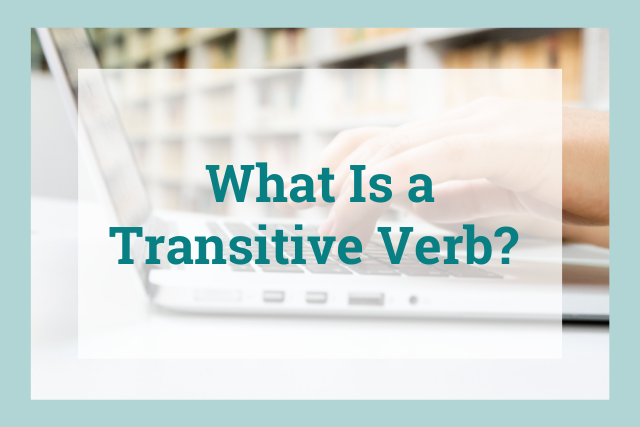
When you’re writing, it’s important to understand the different grammatical roles that a word can play.
You probably know the different parts of speech— nouns , verbs , prepositions , and so on—but each of those is a category of its own and has its own subcategories.
For instance, there are many types of verbs, and one of those types is called the transitive verb.
A transitive verb is an action verb whose action is received by a direct object .
Read on to learn how to identify a transitive verb and what some examples look like in writing.
What Is a Transitive Verb?
How can i identify transitive and intransitive verbs, can the same verb be both transitive and intransitive, what are some examples of transitive verbs in writing, when can i use transitive verbs.
A transitive verb is an action verb that requires someone or something to receive that action (a direct object ).
Take a look at the following examples of transitive verbs:
- “Gabrielle fixed the broken radio.”
In this case, “fixed” is the transitive verb, and “the broken radio” is the object being fixed (the direct object).
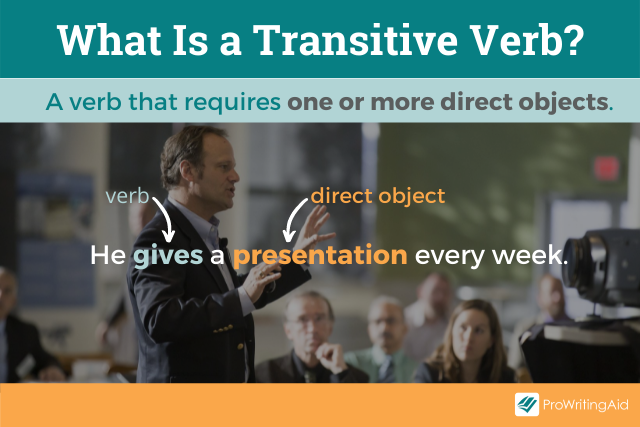
- “Abdul reads the newspaper.”
In this case, “reads” is the transitive verb, and “the newspaper” is the object being read.
- “That scary dog bit me.”
In this case, “bit” is the transitive verb, and “me” is the person being bitten.
The most common structure of a sentence with a transitive verb is:
Subject + action verb + direct object
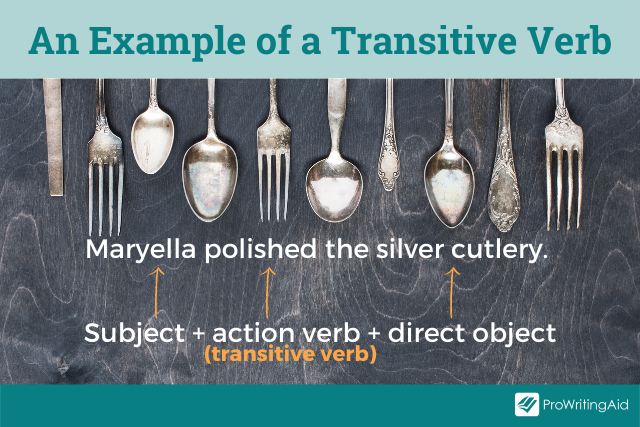
The word “transitive” comes from the idea that the action must transition through the verb to an object in order to complete its meaning.
For example, “Gabrielle fixed” is not a complete sentence, and doesn’t make sense on its own. You need to add in the direct object to finish the sentence: “Gabrielle fixed the broken radio.”
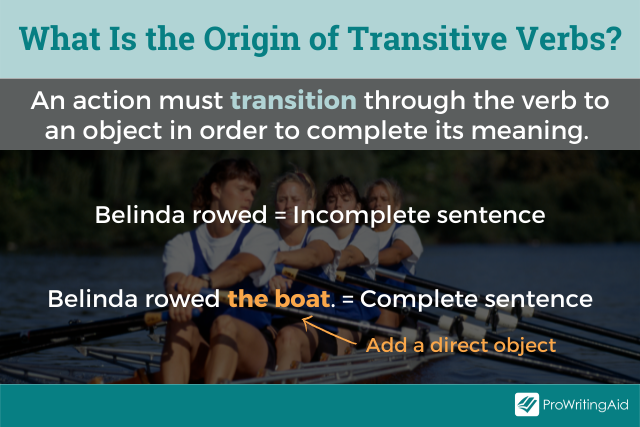
Action verbs can either be transitive or intransitive . There are two methods you can use to figure out which type of verb you’re dealing with.
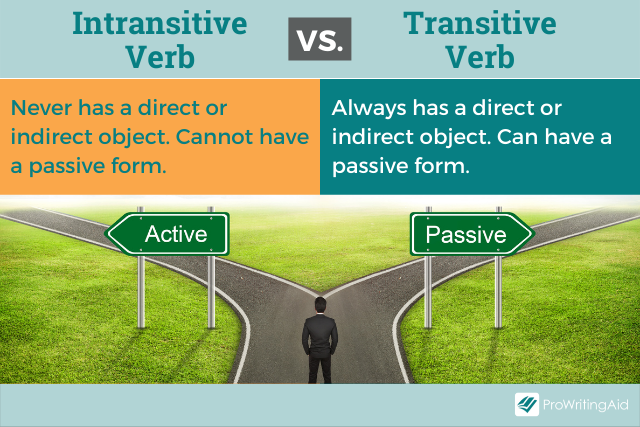
Method 1: A Transitive Verb Has a Direct Object, While an Intransitive Verb Does Not
The simplest way to identify a transitive word is to see if you can find a direct object in the sentence.
A direct object is something or someone who receives the action being performed.
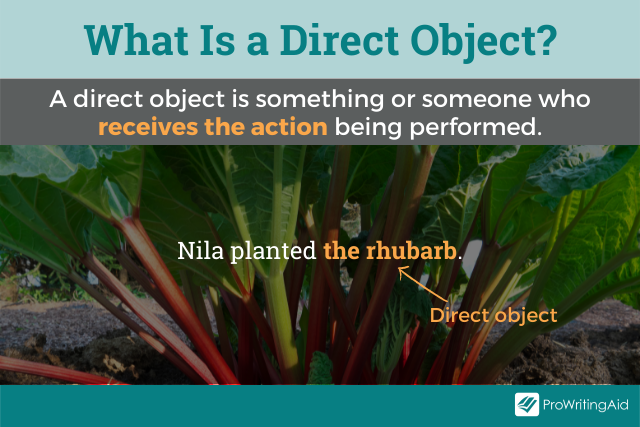
When you see an action verb, ask yourself, “What’s the object receiving this action?”
If the action is done to something or someone , you’re looking at a transitive verb.
For example, “Jeremy kicked the soccer ball.” Here, the kick is being received by the soccer ball, so you know the verb is transitive.
An intransitive verb, on the other hand, doesn’t have a direct object. Consider the sentence “Jeremy laughed.”
The verb is “laughed”, and there’s no object in the sentence that needs to receive the action.
Don’t be fooled if there are other words after the verb—they aren’t necessarily a direct object.
For example, you could say “Jeremy laughed merrily”, which places an extra word after “laughed”.
But the word “merrily” is an adverb that tells us more about the verb, not a direct object that receives the action.
Method 2: A Transitive Verb Can Have a Passive Form, While an Intransitive Verb Cannot
Another trick you can use is to try to imagine the verb in a passive form (Direct Object + “was” + Transitive Verb).
Transitive verbs can have a passive form , while intransitive verbs cannot.
Here are some examples of transitive verbs in the passive form, which sound logical and correct:
- “Gabrielle fixed the broken radio.” → “The broken radio was fixed .”
- “Tommy reads the newspaper.” → “The newspaper was read .”
- “That scary dog bit me.” → “I was bitten .”
For contrast, here are some examples of intransitive verbs in the passive form, which sound rather nonsensical:
- “The soccer ball was existed .” (“existed” is intransitive)
- “The people was laughed .” (“laughed” is intransitive)
- “I was smiled .” (“smiled” is intransitive)
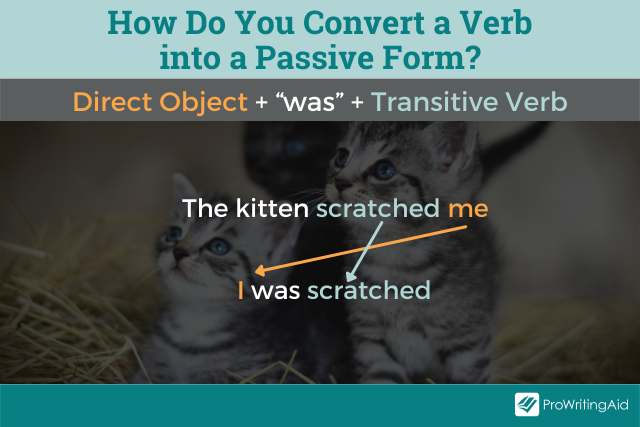
The passive voice places the reader's focus on the object rather than the action. This means it takes longer for the reader to understand who or what is completing the action.
If you can, convert your passive transitive verbs to active ones to make your writing more engaging.
ProWritingAid will highlight passive transitive verbs in your writing and suggest active rephrasings.
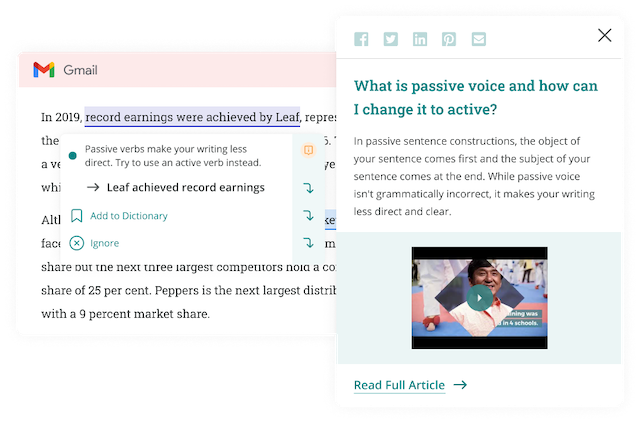
Try the passive voice check with a free ProWritingAid account.
There are verbs that can be transitive or intransitive, depending on whether the sentence has a direct object or not.
Here are some examples of verbs that can work either way:
Verb: “to play”
- Transitive: “I will play the violin.”
- Intransitive: “I will play tomorrow night.”
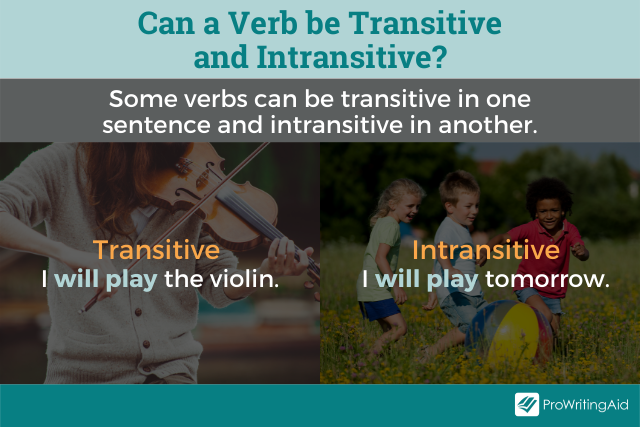
Verb: “to walk”
- Transitive: “Can you walk my dog?”
Intransitive: “Can you walk toward me?”
Verb: “to eat”
- Transitive: “She eats a lot of chocolate.”
- Intransitive: “She eats alone.”
Verb: “to run”
- Transitive: “I ran the whole organization.”
- Intransitive: “I ran away.”
Let’s take a look at some transitive verbs in famous literary passages.
“ Moonlight drowns out all but the brightest stars. " – J.R.R. Tolkien, The Lord of the Rings
- The subject: moonlight
- The transitive verb: drowns out
- The direct object: all but the brightest stars
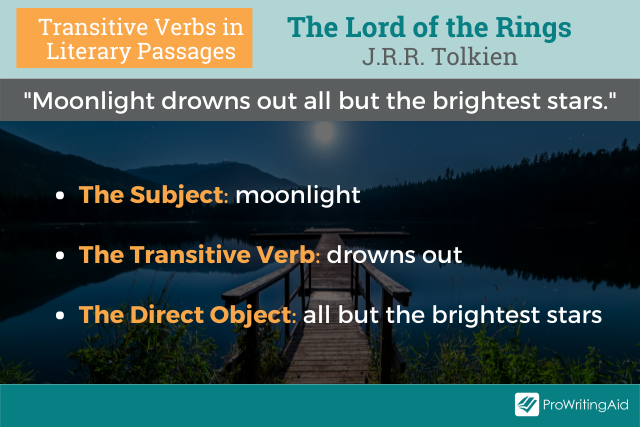
"There are years that ask questions and years that answer." – Zora Neale Hurston, Their Eyes Were Watching God
- The subject: years
- The transitive verb: ask
- The direct object: questions
" I loved her against reason, against promise, against peace, against hope, against happiness, against all discouragement that could be.” – Charles Dickens, Great Expectations
- The subject: I
- The transitive verb: loved
- The direct object: her
"Well, I must endure the presence of a few caterpillars if I wish to become acquainted with the butterflies." – Antoine de Saint-Exupéry, The Little Prince
- The transitive verb: endure
- The direct object: the presence of a few caterpillars
“I hope she’ll be a fool —that’s the best thing a girl can be in this world, a beautiful little fool.” – F. Scott Fitzgerald, The Great Gatsby
- The subject: she
- The transitive verb: will be
- The direct object: a fool
“ I gave my whole heart up , for him to hold.” – Geoffrey Chaucer, The Canterbury Tales
- The transitive verb: gave up (note that this phrase is split around the direct object, as a stylistic choice)
- The direct object: my whole heart
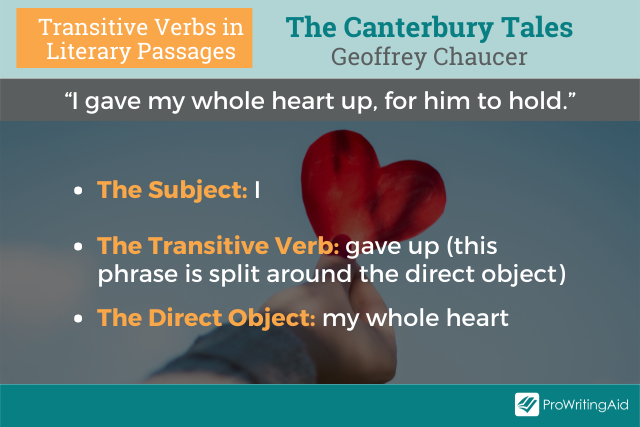
“ Time , which sees all things , has found you out .” – Sophocles, Oedipus the King
- The first subject: time
- The first transitive verb: sees
- The first direct object: all things
- The second subject: time
- The second transitive verb: found out (note that this phrase is split around the direct object, as a stylistic choice)
- The second direct object: you
"If you tell the truth you do not need a good memory !" – Mark Twain, Adventures of Huckleberry Finn
- The first subject: you
- The first transitive verb: tell
- The first direct object: the truth
- The second subject: you
- The second transitive verb: need
- The second direct object: a good memory
" I ’ve got the key to my castle in the air, but whether I can unlock the door remains to be seen." – Louisa May Alcott, Little Women
- The first subject: I
- The first transitive verb: got
- The first direct object: the key
- The second subject: I
- The second transitive verb: unlock
- The second direct object: the door
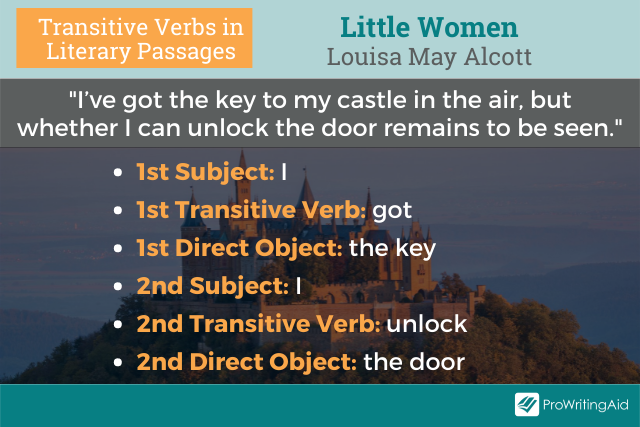
Now you know what transitive verbs are, you'll spot them everywhere. You can use them in everything from essays, creative writing, and emails to everyday speech to bring your writing to life.
Take your writing to the next level:

20 Editing Tips From Professional Writers
Whether you are writing a novel, essay, article, or email, good writing is an essential part of communicating your ideas., this guide contains the 20 most important writing tips and techniques from a wide range of professional writers..

Be confident about grammar
Check every email, essay, or story for grammar mistakes. Fix them before you press send.
Hannah Yang is a speculative fiction writer who writes about all things strange and surreal. Her work has appeared in Analog Science Fiction, Apex Magazine, The Dark, and elsewhere, and two of her stories have been finalists for the Locus Award. Her favorite hobbies include watercolor painting, playing guitar, and rock climbing. You can follow her work on hannahyang.com, or subscribe to her newsletter for publication updates.
Get started with ProWritingAid
Drop us a line or let's stay in touch via :

English Current
ESL Lesson Plans, Tests, & Ideas
- North American Idioms
- Business Idioms
- Idioms Quiz
- Idiom Requests
- Proverbs Quiz & List
- Phrasal Verbs Quiz
- Basic Phrasal Verbs
- North American Idioms App
- A(n)/The: Help Understanding Articles
- The First & Second Conditional
- The Difference between 'So' & 'Too'
- The Difference between 'a few/few/a little/little'
- The Difference between "Other" & "Another"
- Check Your Level
- English Vocabulary
- Verb Tenses (Intermediate)
- Articles (A, An, The) Exercises
- Prepositions Exercises
- Irregular Verb Exercises
- Gerunds & Infinitives Exercises
- Discussion Questions
- Speech Topics
- Argumentative Essay Topics
- Top-rated Lessons
- Intermediate
- Upper-Intermediate
- Reading Lessons
- View Topic List
- Expressions for Everyday Situations
- Travel Agency Activity
- Present Progressive with Mr. Bean
- Work-related Idioms
- Adjectives to Describe Employees
- Writing for Tone, Tact, and Diplomacy
- Speaking Tactfully
- Advice on Monetizing an ESL Website
- Teaching your First Conversation Class
- How to Teach English Conversation
- Teaching Different Levels
- Teaching Grammar in Conversation Class
- Members' Home
- Update Billing Info.
- Cancel Subscription
- North American Proverbs Quiz & List
- North American Idioms Quiz
- Idioms App (Android)
- 'Be used to'" / 'Use to' / 'Get used to'
- Ergative Verbs and the Passive Voice
- Keywords & Verb Tense Exercises
- Irregular Verb List & Exercises
- Non-Progressive (State) Verbs
- Present Perfect vs. Past Simple
- Present Simple vs. Present Progressive
- Past Perfect vs. Past Simple
- Subject Verb Agreement
- The Passive Voice
- Subject & Object Relative Pronouns
- Relative Pronouns Where/When/Whose
- Commas in Adjective Clauses
- A/An and Word Sounds
- 'The' with Names of Places
- Understanding English Articles
- Article Exercises (All Levels)
- Yes/No Questions
- Wh-Questions
- How far vs. How long
- Affect vs. Effect
- A few vs. few / a little vs. little
- Boring vs. Bored
- Compliment vs. Complement
- Die vs. Dead vs. Death
- Expect vs. Suspect
- Experiences vs. Experience
- Go home vs. Go to home
- Had better vs. have to/must
- Have to vs. Have got to
- I.e. vs. E.g.
- In accordance with vs. According to
- Lay vs. Lie
- Make vs. Do
- In the meantime vs. Meanwhile
- Need vs. Require
- Notice vs. Note
- 'Other' vs 'Another'
- Pain vs. Painful vs. In Pain
- Raise vs. Rise
- So vs. Such
- So vs. So that
- Some vs. Some of / Most vs. Most of
- Sometimes vs. Sometime
- Too vs. Either vs. Neither
- Weary vs. Wary
- Who vs. Whom
- While vs. During
- While vs. When
- Wish vs. Hope
- 10 Common Writing Mistakes
- 34 Common English Mistakes
- First & Second Conditionals
- Comparative & Superlative Adjectives
- Determiners: This/That/These/Those
- Check Your English Level
- Grammar Quiz (Advanced)
- Vocabulary Test - Multiple Questions
- Vocabulary Quiz - Choose the Word
- Verb Tense Review (Intermediate)
- Verb Tense Exercises (All Levels)
- Conjunction Exercises
- List of Topics
- Business English
- Games for the ESL Classroom
- Pronunciation
- Teaching Your First Conversation Class
- How to Teach English Conversation Class
Transitive vs. Intransitive Verbs: Explanation & Exercises
Learning the difference between transitive and intransitive verbs can help students of English improve their knowledge of English grammar, which improves fluency. This page will help you identify transitive and intransitive verbs and phrasal verbs.
Transitive Verbs
A transitive verb is a verb that can have an object . For example, the verb kick .
Sandra kicked the ball .
( subject )+( verb )+( object ).
The object of the verb kick in the above sentence is the ball. Transitive verbs like kick are common in English. They describe actions that can be done to something . For example,
- She bought the cake .
- She caught the ball .
- He has found a problem .
- He will take a train .
- He is reading a letter .
Hint : Think of ' trans itive' as a verb that can be 't rans ferred' an object. If it can take an object, it can be used as a transitive verb.
Intransitive Verbs
An intransitive verb is a verb that cannot have an object . For example, the verb sleep .
People sleep .
( subject )+( verb ).
In this example, there is only a subject (the person doing the action) and a verb . There is no object. Here are some other examples of intransitive verbs:
Identifying Intransitive and Transitive Verbs
To know if the verb in a sentence is transitive, you need to see if the verb has an object in the sentence. To do that, ask What the subject did with the verb. For example:
- She opened the door . > She opened what ? = the door . 'The door' is an object, so we know the verb is used transitively.
- The manager will close the store early . > The manager will close what ? = the store . This means the verb is transitive.
- The children sat . > The children sat what ? = ?? This question doesn't make sense. You cannot sit something because sit is only an intransitive verb.
Note that not everything that comes after a verb is an object. Compare these two sentences:
- The children sat . (Intransitive -- the verb sat has no object)
- The children sat in chairs . (Intransitive -- in is a preposition, so in chairs is a prepositional phrase that describes where the children sat; it does not tell you what the children sat.)
- The children sat happily in chairs with their friends . (Intransitive, again. Here, happily is an adverb describing how they sat, and in chairs and with their friends are phrases started with prepositions.)
Verbs that Can Be Both Transitive and Intransitive
Some verbs have both a transitive and intransitive form.
- The dog eats . (Intransitive -- the verb has no object)
- The dog eats food . (Transitive -- the object 'food' means the verb is used transitively).
- Roger cleans often . (Intransitive -- there is no object. Often is an adverb describing how often something happens. It does not tell you w hat Roger cleans).
- Roger cleans his bathroom often . (Transitive -- Roger cleans what? His bathroom . That is the object of the verb.)
This is true of many verbs (there are too many to list). If you do not know if a verb is transitive or intransitive (or both), you can look it up in the dictionary.

The woman is running. (Intransitive). She is running a marathon . (transitive)
Do you understand how to identify transitive and intransitive verbs? Try these exercises!
Exercise: Determine If the Sentence Is Transitive or Intransitive
- The train arrived. (select answer) Transitive Intransitive
- The passengers rode the train. (select answer) Transitive Intransitive
- The baby drinks from his bottle. (select answer) Transitive Intransitive
- The baby drinks milk from his bottle. (select answer) Transitive Intransitive
- The bird is flying away. (select answer) Transitive Intransitive
- The woman ordered a sandwich with mustard and mayonnaise. (select answer) Transitive Intransitive
- The sun warms our planet throughout the year. (select answer) Transitive Intransitive
- Some birds in Canada fly south in the winter. (select answer) Transitive Intransitive
Check Answers
1. Intransitive . The verb arrive cannot have an object. 2. Transitive . The passengers rode what? The train. This is the object. 3.. Intransitive . What did the baby drink? We don't know because there is no object. The phrase "from his bottle" is a prepositional phrase, not an object. 4. Transitive . What did the baby drink? Milk. 5. Intransitive . Away is an adverb (it is a direction), not what the bird flies. 6. Transitive . What did the woman order? A sandwich. 7. Transitive . What does the sun warm? Our planet. 8. Intransitive . South is a direction (an adverb) that tells you where the birds flew; it is not the object of the verb. In the winter is a prepositional phrase telling you when .
Is the Verb 'to be' Transitive or Intransitive?
The BE verb is not transitive or intransitive. It is called a linking verb . Instead of following the subject + verb + object format, sentences with linking verbs follow this format:
The man is a doctor .
[subject] + [ verb] + [ complement]
Other linking verbs include appear, become, feel, grow, look, smell, sound, taste. These verbs, when used as linking verbs, are neither transitive nor intransitive.
Commonly Confused Intransitive Verbs
These verbs are commonly confused by students (even advanced students):
To practice the difference between these two verbs, see the below related pages:
- Lay & Lie Exercises
- Raise & Rise Exercises
Exercise Group #2: Confusing Transitive & Intransitive Verbs
- Only one student raised her hand. (select answer) Transitive Intransitive
- The airplane slowly rose above the clouds. (select answer) Transitive Intransitive
- She laid the flowers on the grave. (select answer) Transitive Intransitive
- He lay still without moving. (select answer) Transitive Intransitive
- The team was tired last night. (select answer) Transitive Intransitive BE Verb (linking verb)
- Nothing will happen. (select answer) Transitive Intransitive
- They are going to release the schedule next week. (select answer) Transitive Intransitive
1. Transitive - What did she raise? Her hand 2. Intransitive - The verb rise cannot have an object. 3. Transitive - What did she lay? Flowers 4. Intransitive - This is the verb 'lie' in the past tense ('lay'), which is an intransitive verb. How do we know it's not 'lay' in the present tense? The answer: there's no object in the sentence (He lay what ?). This shows that we are using an intransitive verb. 5. BE Verb (linking verb) - This is a sentence with the BE verb, which is a linking verb. 6. Intransitive - The verb happen cannot have an object. (You cannot actively 'happen something') 7. Transitive - What is going to be released? The schedule. This is the object of the verb 'release'.
Advanced Exercises: Transitive & Intransitive Verbs and the Passive Voice
Try to identify the verb type in these sentences, which include both the active and passive voice . Keep in mind that the passive voice can only be formed with transitive verbs. (If you are not familiar with the passive voice, please study it before trying this section.)
- Rice is grown on farms by farmers. (select answer) Transitive (Passive Voice) Transitive (Active Voice) Intransitive
- Several issues were raised at the meeting. (select answer) Transitive (Passive Voice) Transitive (Active Voice) Intransitive
- John wasn't ready for his test. (select answer) Transitive-Passive Voice Transitive (Active Voice) Intransitive BE Verb (linking verb)
- A special gift is being presented to Mr. Cooper. (select answer) Transitive (Passive Voice) Transitive (Active Voice) Intransitive
- Our teacher is going to punish us. (select answer) Transitive (Passive Voice) Transitive (Active Voice) Intransitive
- Dinosaurs existed 65 million years ago. (select answer) Transitive (Passive Voice) Transitive (Active Voice) Intransitive
- The temperature has been increased to 350 degrees. (select answer) Transitive (Passive Voice) Transitive (Active Voice) Intransitive
- The company has been lowering employee salaries for years. (select answer) Transitive (Passive Voice) Transitive (Active Voice) Intransitive
1. Transitive (Passive Voice) - This is a sentence in the passive voice. The subject, rice, is the object of the verb 'grow'. 2. Transitive (Passive Voice) - The object of the verb 'raise' is 'several issues', which becomes the subject of the sentence when passive voice is used. 3. BE Verb (linking verb) - This is a sentence with the Be verb + an adjective (ready). 4. Transitive (Passive Voice) - The object of the verb 'present' is a special gift. The verb is in the present continuous tense ( is presenting ) in the passive voice, which becomes is being presented. (auxiliary verb + BE verb + past participle) 5. Transitive (Active Voice) - The object of the verb 'punish' is 'us', which comes after the verb. The actor of the verb, 'Our teacher', is the subject. The actor/agent of the verb is always the subject in the active voice. - 6. Intransitive - The verb 'exist' cannot have an object. 7. Transitive (Passive Voice) - The verb 'increase' can have an object. Here, the object of the verb 'increase' is 'the temperature', which becomes the subject of the verb in a passive voice sentence. 8. Transitive (Active Voice) - The verb 'lower' can have an object. The subject of the sentence, 'The company' is the actor/agent who is doing the action (lowering), which means the sentence is in the active voice.
If you find this section challenging, try some easier passive voice exercises .
Transitive and Intransitive Phrasal Verbs
A phrasal verb is like an idiom–it is a phrase that has a special meaning. Phrasal verbs have a main verb and another word that is usually either an adverb or a preposition . Phrasal verbs can be intransitive (without an object):
- You need to calm down . (to calm down = to relax)
- Her grandfather passed away . (to pass away = to die)
- Let's get together on Tuesday. (to get together = to meet someone)
Phrasal verbs can also be transitive (with an object ):
- The teacher passed out some papers . (to pass out = to distribute)
- The student made up an excuse . ( to make something up = to invent something, usually a story or game)
- You should pick up your garbage . (to pick up = to lift something; to collect something)
One tricky part is that the object of a phrasal verb can often come between the two verbs:
- The teacher passed some papers out . (to pass out = to distribute)
- The student made an excuse up . ( to make something up = to invent something, usually a story or game)
- You should pick it up . (to pick up = to lift something; to collect something)
There is no difference in meaning.
As a final note, some phrasal verbs are three words . Here are some examples:
- People look up to celebrities . (Transitive verb, to look up to [someone] = to admire someone)
- I can't put up with this cold weather any longer. I need a vacation! (Transitive verb, to put up with = to tolerate something)
- We are looking forward to the weekend . (Transitive verb, to look forward to = to await a future event eagerly)
Exercise Group #1: Transitive and Intransitive Phrasal Verbs
- Let's cheer up Brenda. (select answer) Transitive Intransitive
- Cheer up, Brenda! (select answer) Transitive Intransitive
- She figured out the answer. (select answer) Transitive Intransitive
- My father and I get along well. (select answer) Transitive Intransitive
- We need to work out a way to save money. (select answer) Transitive Intransitive
1. Transitive . 'Brenda' is the object of the phrasal verb cheer up . 2. Intransitive . There is no object here. 'Brenda!' describes who you are talking to (it would be the same to say 'Brenda, cheer up!'). 3. Transitive . The noun phrase the answer is the object of the verb figure out . 4. Intransitive . There is no object here. Well is an adverb. 5. Transitive . What do we want to work out (solve)? A way to save money.
Exercise Group #2: Transitive and Intransitive Phrasal Verbs
- (Jane and Andy are always fighting.) They should break up already! (select answer) Transitive Intransitive
- The police officer broke up the fight. (select answer) Transitive Intransitive
- The printer has run out of paper again. (select answer) Transitive Intransitive
- The man passed out after being hit on the head. (select answer) Transitive Intransitive
- Let's put the meeting off until next week. (select answer) Transitive Intransitive
1. Intransitive . The phrasal verb break up, meaning to end a relationship, cannot have an object. 2. Transitive . The phrasal verb break up , meaning to end something, does have an object (that tells you what was ended). 3. Transitive . Run out of is a three-word phrasal verb. Paper is the object in this sentence. 4. Intransitive . The phrasal verb pass out, meaning to lose consciousness, does not take an object. The clause after being hit on the head describes when he passed out; it is not an object. 5. Transitive . What do we want to put off (postpone)? The meeting. (The object here is between the phrasal verb).
For help with phrasal verbs, see our common phrasal verb list (with definitions) or test your knowledge with our phrasal verb game .
Questions? Find a mistake? Leave a comment below.
- Matthew Barton / Creator of www.englishcurrent.com
EnglishCurrent is happily hosted on Dreamhost . If you found this page helpful, consider a donation to our hosting bill to show your support!
65 comments on “ Transitive vs. Intransitive Verbs: Explanation & Exercises ”
Thank you so much for helping me.
qwerty we hate english thanks to you i got confidence so i like it now d3wt24
thanks very useful
tomorrow exam
this is very nice way of teaching . I liked this way of teaching
VERY USEFUL THANKS A LOT
thank you a lot
thanks really useful
thanks a lot .it was helpful
Please could you explain this to me, as I want to be sure I understand. I have copied the below from the intransitive section above. ‘Walk’ is an intransitive verb, yet if I was to say, “I walk the dog” would it be a transitive verb?
Intransitive Verbs An intransitive verb is a verb that cannot have an object. For example, the verb sleep. People sleep. (subject)+(verb). In this example, there is only a subject (the person doing the action) and a verb. There is no object. Here are some other examples of intransitive verbs: cry die fall smile walk
Hello Penny. You seem to understand correctly. The verb ‘walk’, which means to move one foot ahead of the other, is an intransitive verb with no object. However, there is a secondary meaning of ‘walk’, which can mean to guide an animal. This secondary meaning of walk is transitive.
it is helpful now i understand
Cody passed the book to Paul. IS THIS TRANS OR INTRANS please answer because our answer key at school says intransitive… even tho its seems that its not
It is transitive.
Thank you! I understand now
Can you please give me a page of transitive and intransitive verb? I need to teach my child. Plzz. We have been told to give a page of transitive and intransitive verb exercise. But you have given me explanation Plzz.
Please search online.
It was very useful, thank you for your information.
On the exercises section you should only give explanation once the question was answared. What is the point in giving explanation before you had the chance to reply it?
They aren’t, but if you view the page via mobile, you see a stripped-down AMP (accelerated mobile page) version of the page. This version doesn’t allow for Javascript, which is why the answers are shown and not hidden. I will modify it in the next few days with an AMP-compatiable method.
Really thanks! You’ve got a great content here. I’m sorry if I sounded harsh.
THANKS ALOT, IT WILL HELP ME IN MY ENGLISH EXAM WHICH WILL HELD ON TUESDAY…
Only one work: outstanding
It is very helpful for me because it is a practice assignment for me.
Not bad.you should put more exercises which would help others as well as me…..
Based on your feedback, I have added a new section that deals with phrasal verbs. Enjoy!
very helpful
Its very useful. You should find a better way to check our work. I think you applodd more transitive an intransitive vebs.
Hello. I have added some Javascript to the page and more exercises.
Nice very good explaining thank u
In the 2nd exercise group, “#4. He lied still without moving.” I believe this is not actually correct English. There are two words ‘lie’. The one means to utter a falsehood, the other means to recline, as on a bed. The forms of the verb that you list are accurate for the first meaning. However, for the second word they should read: “lie, lay, laid.” So, #4. should read: He lay still without moving.
Great catch Suzanne! You are entirely right. I have changed it. Thanks a lot for the feedback. it’s very helpful.
It was really helpful thank you !!!!!
Thank you very much.It is really very helpful
I want to understand that why intransitive and transative are called intransitive and transative.
A verb that is ‘transitive’ can be _trans_ferred an object.
qwerty we hate english thanks to you i got confidence so i like it now
i love this
Thanks a lot this helps me a lot thank you thank you very much bye bye
May the good Lord help u guys you’ve done well
It was fun doing you question It was quiet easy and interesting I appreciate your way for preparing question and special mcq
Nice and difficult exercise phir bhi best
many thank for your website. Best regard
understood a lot it was very nice
THANK YOU FOR THIS
This side is so good. I learnt a lot from this side. These had explanations.
thank you for help
I am having exam tomorrow so, i am pracyicing in this…..I liked it so much…
sorry spelling mistake
I am having an exam tomorrow so, I am practicing for this…..I liked it so much…
Hi, Thanks. I will make use of this for teaching transitivity of verbs
Thank you so much I was really confused about this topic but now I’m clearly understanding these transitive and intransitive verbs tysm
hi this helped a lot
Thank you so much! This is great.
Hi, This helped me so much, while preparing for my English exam, that is tomorrow. Wish me luck!
were good worksheet more and more practice questions
thankkyouuuu, i practised well. Hoping for more such websites. You make learningso much fun. Hats off to the creaters. xx From, chicago
very educative.Thanks a lot.
hi i dont understand Transitive and Intransitive
Thank you for your atention

Leave a Reply Cancel reply
Your email address will not be published. Required fields are marked *

Mastering the Transitive Verb: Your Key to Fluent English
By: Author ESLBUZZ
Posted on Last updated: August 8, 2023
Sharing is caring!
Transitive verbs are an essential part of English grammar. They are verbs that require an object to complete their meaning in a sentence. Understanding transitive verbs is crucial for anyone who wants to improve their writing skills and communicate effectively in English. In this article, we will explore what transitive verbs are, how they function in a sentence, and provide examples to help you better understand their usage.
We will discuss the different types of transitive verbs, how to identify them, and provide examples to help you understand their usage. By the end of this article, you will have a better understanding of how to use transitive verbs in your writing and communication, helping you to express yourself more clearly and effectively in English.
Transitive Verb

Understanding Transitive Verbs
If you’re learning English, you’ve probably heard of transitive verbs. These verbs are an essential part of the English language and are used in many different ways. In this section, we’ll explore what transitive verbs are and how they work.
Definition of Transitive Verbs
A transitive verb is a verb that requires an object to complete its meaning. In other words, it’s a verb that needs to have something done to it. For example, in the sentence “She eats an apple,” the verb “eats” is transitive because it requires an object, “an apple,” to complete its meaning.
Examples of Transitive Verbs
Here are some more examples of transitive verbs:
- She reads a book.
- He throws the ball.
- They bought a car.
- We watched a movie.
In each of these sentences, the verb requires an object to complete its meaning. Without the object, the sentence wouldn’t make sense.
Direct Objects
The object that follows a transitive verb is called the direct object. It’s the thing that receives the action of the verb. In the sentence “She eats an apple,” “an apple” is the direct object because it’s what is being eaten.
Here are some more examples of direct objects:
In each of these sentences, the direct object is the thing that is being read, thrown, bought, or watched.
Indirect Objects
Some transitive verbs can also take an indirect object. An indirect object is a noun or pronoun that indicates to or for whom or what the action of the verb is done. For example, in the sentence “She gave him a present,” “him” is the indirect object because he is the one who receives the present.
Here are some more examples of indirect objects:
- She told me a story.
- He gave his sister a hug.
- They sent us a postcard.
- We made the children some cookies.
In each of these sentences, the indirect object is the person or thing that is receiving the action of the verb.
Identifying Transitive Verbs
As a grammar learner, it’s important to be able to identify transitive verbs in a sentence. Transitive verbs are verbs that require a direct object to complete their meaning. In this section, we’ll explore how to identify transitive verbs using two methods: the use of direct objects and context clues.
Use of Direct Objects
One way to identify a transitive verb is to look for a direct object in the sentence. A direct object is a noun or pronoun that receives the action of the verb. For example, in the sentence “She ate a sandwich,” the verb “ate” is transitive because it requires a direct object, “a sandwich,” to complete its meaning.
Here are some more examples of transitive verbs with their direct objects:
By looking for direct objects, you can easily identify transitive verbs in a sentence.
Context Clues
Another way to identify transitive verbs is to look for context clues in the sentence. Transitive verbs often express an action that is done to someone or something. For example, in the sentence “He gave his friend a hug,” the verb “gave” is transitive because it requires a direct object, “a hug,” to complete its meaning.
Here are some more examples of transitive verbs with context clues:
- She sent the email to her boss.
- They sold their car to a dealership.
- He taught the students a new lesson.
- We showed our guests around the city.
By looking for context clues, such as who or what is receiving the action of the verb, you can identify transitive verbs in a sentence.
Differences Between Transitive and Intransitive Verbs
Transitive and intransitive verbs are two types of verbs in English grammar. The main difference between them is that transitive verbs require a direct object to complete their meaning, while intransitive verbs do not.
A direct object is a noun or pronoun that receives the action of the verb. For example, in the sentence “She threw the ball,” “ball” is the direct object of the transitive verb “threw.” Without the direct object, the sentence would be incomplete and meaningless.
On the other hand, intransitive verbs do not take a direct object. They express a complete thought without needing an object. For example, in the sentence “She laughed,” the verb “laughed” is intransitive because it does not require an object to complete its meaning.
Here are some examples of transitive and intransitive verbs:
Let’s look at some example sentences to see how transitive and intransitive verbs are used:
- She ate an apple. (transitive)
- He slept soundly. (intransitive)
- They wrote a letter to their friend. (transitive)
- She ran a marathon. (intransitive)
- He kicked the ball. (transitive)
- She laughed at the joke. (intransitive)
- He threw the ball to his friend. (transitive)
- She smiled at the camera. (intransitive)
As you can see from these examples, transitive verbs require a direct object to complete their meaning, while intransitive verbs do not.
Common Transitive Verbs
Transitive verbs are an essential part of English grammar. They are verbs that require an object to complete their meaning. In other words, they need to have a direct object to make sense. Here are some of the most common transitive verbs in English:
Verbs of Action
Verbs of action are transitive verbs that describe an action or movement. They are often used in sentences that describe physical activities. Here are some examples:
- throw : I threw the ball to my friend.
- write : She wrote a letter to her grandmother.
- kick : He kicked the ball into the goal.
- eat : We ate pizza for dinner.
- drive : He drove his car to work.
Verbs of Perception
Verbs of perception describe how we perceive the world around us. They are often used in sentences that describe our senses. Here are some examples:
- see : I saw a bird in the tree.
- hear : She heard the music from the other room.
- smell : He smelled the flowers in the garden.
- feel : We felt the sand between our toes.
- taste : He tasted the soup and added more salt.
Verbs of Communication
Verbs of communication are transitive verbs that describe how we communicate with others. They are often used in sentences that describe speech or writing. Here are some examples:
- tell : She told me a story about her childhood.
- write : He wrote a poem for his girlfriend.
- ask : They asked me for directions to the museum.
- explain : He explained the rules of the game to us.
- teach : She taught me how to play the piano.
Verbs of Possession
Verbs of possession describe ownership or possession. They are often used in sentences that describe who owns or possesses something. Here are some examples:
- have : I have a cat named Whiskers.
- own : She owns a small business.
- possess : He possesses a rare collection of stamps.
- hold : They hold the record for the fastest marathon time.
- keep : She keeps her keys in her purse.
Transitive Verbs in Passive Voice
When a sentence is in the passive voice , the subject of the sentence is the receiver of the action, not the doer. Transitive verbs are the only verbs that can be used in the passive voice. This is because transitive verbs require a direct object, which can become the subject of the sentence in the passive voice.
To form a passive sentence, we need to use a form of the auxiliary verb “be” (am, is, are, was, were, been, being) followed by the past participle of the main verb. The direct object of the active sentence becomes the subject of the passive sentence, and the subject of the active sentence becomes the object of the preposition “by.”
Here are some examples of transitive verbs in the passive voice:
- Active: The chef cooked the meal. Passive: The meal was cooked by the chef.
- Active: The company will launch a new product. Passive: A new product will be launched by the company.
- Active: They gave me a gift. Passive: I was given a gift by them.
Notice how the direct object in the active sentence becomes the subject in the passive sentence, and the doer of the action in the active sentence becomes the object of the preposition “by” in the passive sentence.
It’s important to note that not all transitive verbs can be used in the passive voice. Some transitive verbs have a direct object that cannot become the subject of a passive sentence. For example, the verb “believe” is transitive, but it cannot be used in the passive voice because the direct object is a clause, not a noun.
In conclusion, understanding transitive verbs is crucial for effective communication in English. By knowing the difference between transitive and intransitive verbs, you can ensure that your sentences are grammatically correct and convey the intended meaning.
To recap, we learned that a transitive verb is a verb that requires a direct object to complete its meaning. The direct object receives the action of the verb, and without it, the sentence would not make sense. In contrast, intransitive verbs do not require a direct object.
We also explored some common examples of transitive verbs, such as “eat,” “read,” and “drive,” and learned how to identify them in a sentence. Additionally, we discussed the importance of using correct word order when using transitive verbs.
To further improve your understanding of transitive verbs, it is recommended that you practice using them in your own writing and speaking. Try to incorporate some of the examples we discussed into your sentences and pay attention to the word order and use of direct objects.
Overall, by mastering transitive verbs, you can improve your English language skills and communicate more effectively.
Frequently Asked Questions
What is a transitive verb and how is it different from an intransitive verb?
A transitive verb is a verb that requires a direct object to complete its meaning. In contrast, an intransitive verb does not require a direct object. For example, in the sentence “She ate an apple,” the verb “ate” is transitive because it requires the direct object “apple” to complete its meaning. On the other hand, in the sentence “She laughed,” the verb “laughed” is intransitive because it does not require a direct object.
What are some examples of transitive verbs?
Some common examples of transitive verbs include “give,” “take,” “eat,” “write,” “paint,” “love,” and “hate.” These verbs all require a direct object to complete their meaning.
How can you identify a transitive verb in a sentence?
To identify a transitive verb in a sentence, look for a verb that requires a direct object to complete its meaning. Ask yourself, “What is the verb doing?” If the answer requires a direct object, the verb is transitive.
What are some common mistakes people make when using transitive verbs?
One common mistake people make when using transitive verbs is failing to include a direct object. This can result in incomplete or unclear sentences. Another mistake is using an intransitive verb when a transitive verb is required, which can also lead to incomplete or unclear sentences.
How do transitive verbs differ from intransitive verbs in terms of sentence structure?
In a sentence with a transitive verb, the direct object usually comes immediately after the verb. For example, “She wrote a letter.” In contrast, in a sentence with an intransitive verb, there is no direct object. For example, “She laughed.”
What are some tips for using transitive verbs effectively in your writing?
When using transitive verbs in your writing, be sure to include a direct object to ensure that your meaning is clear. Also, consider using a variety of transitive verbs to add interest and variety to your writing. Finally, be careful not to overuse transitive verbs, as this can make your writing seem repetitive.
A transitive verb is a verb that requires a direct object to complete its meaning. In contrast, an intransitive verb does not require a direct object. For example, in the sentence \"She ate an apple,\" the verb \"ate\" is transitive because it requires the direct object \"apple\" to complete its meaning. On the other hand, in the sentence \"She laughed,\" the verb \"laughed\" is intransitive because it does not require a direct object.
"}},{"@type":"Question","name":"What are some examples of transitive verbs?","acceptedAnswer":{"@type":"Answer","text":"
Some common examples of transitive verbs include \"give,\" \"take,\" \"eat,\" \"write,\" \"paint,\" \"love,\" and \"hate.\" These verbs all require a direct object to complete their meaning.
"}},{"@type":"Question","name":"How can you identify a transitive verb in a sentence?","acceptedAnswer":{"@type":"Answer","text":"
To identify a transitive verb in a sentence, look for a verb that requires a direct object to complete its meaning. Ask yourself, \"What is the verb doing?\" If the answer requires a direct object, the verb is transitive.
"}},{"@type":"Question","name":"What are some common mistakes people make when using transitive verbs?","acceptedAnswer":{"@type":"Answer","text":"
"}},{"@type":"Question","name":"How do transitive verbs differ from intransitive verbs in terms of sentence structure?","acceptedAnswer":{"@type":"Answer","text":"
In a sentence with a transitive verb, the direct object usually comes immediately after the verb. For example, \"She wrote a letter.\" In contrast, in a sentence with an intransitive verb, there is no direct object. For example, \"She laughed.\"
"}},{"@type":"Question","name":"What are some tips for using transitive verbs effectively in your writing?","acceptedAnswer":{"@type":"Answer","text":"
- Recent Posts
- Ed Words: Expand Your Vocabulary and Improve Your Writing! - April 15, 2024
- List of Ethnicities and Their Cultures from Around the World - April 2, 2024
- Mastering English Writing: Essential Transitional Words for Body Paragraphs - March 25, 2024
Related posts:
- Simple Rules to Master the Use of Gerunds and Infinitives
- Using Perfect Infinitives with Modal Verbs
- Vocabulary: Action Verbs in English with Pictures
- A Comprehensive List of Verbs: 50 Must-Know Verbs for Fluent English
What Are Transitive Verbs? List And Examples
- What Is A Transitive Verb?
- Rules And Best Practices
- Write With Grammar Coach
It’s time for some cat facts! Cats eat meat. Cats climb trees. Cats drink milk. Cats chase mice and birds. Cats are pretty neat, huh? Well, let’s let the cats go to sleep for now and look closer at our cat facts. In each of our catty sentences, we used verbs to say what kitties do. Verbs are words that we use to describe actions or states of being. In our sentences, we used verbs to say that cats perform actions on something. There are several different types of verbs that we use when we say or write sentences, but all of these cat sentences use the same type of verb called a transitive verb.

What is a transitive verb ?
A transitive verb is “a verb accompanied by a direct object and from which a passive can be formed.” Our definition does a pretty good job of explaining what a transitive verb is, but let’s break it down a little more.
If a verb is considered a transitive verb, that means it can be used with a direct object. In English, a direct object is “a word or group of words representing the person or thing upon which the action of a verb is performed or toward which it is directed.” Take a look at the following sentence:
Jenny kicked the ball.
In this simple sentence, the ball is the direct object because it is having something done to it: it is the thing that Jenny kicked. Because the verb kicked can be used with a direct object, it is functioning as a transitive verb in this sentence.
A useful way to tell if a sentence or clause has a direct object or not, is to ask “What?” or “ Who(m)?” when looking at the verb. For example,
- He baked a cake. Baked what? A cake.
- Jerry hugged his mother. Hugged whom? His mother.
Both of the above sentences are able to answer the question of “What?” or “Who(m)?” so they have direct objects. Therefore, these verbs are transitive verbs. Now, take a look at this sentence:
The kitten slept by the fireplace.
Slept what? Slept whom? You cannot answer either of these questions, so this sentence must not have a direct object. The subject of the sentence is not doing anything that is acting on or affecting anyone. So, the verb slept is not used as a transitive verb. We refer to verbs that aren’t transitive verbs as intransitive verbs . Intransitive verbs aren’t used with direct objects and are often followed by prepositional phrases , adverbs , dependent clauses, and other modifiers.
Find out more about what intransitive verbs are and how they function.
You need to be careful of a few things when looking at sentences. Firstly, sometimes we omit a direct object from a sentence. For example, the sentence I paid Matt 20 dollars might be shortened to I paid Matt. Even though the direct object 20 dollars has been omitted from the sentence and only the indirect object Matt remains, paid is still a transitive verb.
Why is that? This brings us to the second thing mentioned in our earlier definition of transitive verbs. A transitive verb can be used in the passive voice. When we write sentences or clauses in the passive voice , the subject is having an action performed to it rather than performing an action. For example, the following sentence uses a verb in the passive voice:
- Matt was paid twenty dollars by me.
Although this sentence may be a little confusing, it is grammatically correct. It also solves our little mystery because you can see that you can use the verb paid in the passive voice, which means that it must be a transitive verb.
Further, intransitive verbs don’t take a passive form. Look at the following sentences that try to use intransitive verbs in the passive voice and you’ll see that none of them make any sense.
- The Egyptian empire was existed for thousands of years.
- The chick was emerged from the eggshell.
- The bear was hibernated in the cave.
However, there are several important things to keep in mind (there’s always something with grammar): some verbs can be used as both transitive or intransitive verbs depending on meaning and context. For a full discussion of verbs that can function as both, read about them in our article on intransitive verbs .
List of transitive verbs
Many verbs can be used as either a transitive or intransitive verb. The key point to remember is that if a verb can be used with a direct object, it can be a transitive verb. The following list gives examples of verbs that can be used as transitive verbs:
- arrange, break, carry, drink, eat, follow, guess, hate, imagine, jumble, kick, lift, miss, notice, open, pull, quiet, remove, stop, tackle, unlock, visit, watch, yank, zap
Transitive verb examples
The following sentences all use transitive verbs. Remember: a transitive verb can be used with a direct object and/or be used in the passive voice. As you read each example, think about what the direct object of the sentence or clause is, or if the verb is being used in the passive voice.
- I ate supper.
- Santa Claus brings presents to good children every year.
- The clown was chased by a cute, friendly dog.
- The smart student knew all of the right answers.
- The movie was directed by my brother.
- I read the name of the band that played songs at my wedding.
The following two sentences show how a verb can function as a transitive or intransitive verb depending on its meaning and how it is used in a sentence.
- We relaxed on the comfortable sofas.
- We relaxed the children by telling them funny stories.
In the first sentence, relaxed is an intransitive verb because the subject is NOT performing an action on something or someone. We didn’t relax something. In the second sentence, however, the verb relaxed is a transitive verb because the subject DID perform an action on someone: the phrase the children is the direct object of the sentence.
Transitive verb rules & best practices
Let’s review the two main points of transitive verbs:
- Transitive verbs can be used with a direct object.
- Transitive verbs can be used in the passive voice.
This means that different types of verbs can also be transitive verbs. Both regular and irregular verbs can be transitive verbs. Both action verbs and stative verbs can be transitive verbs. At the same time, transitive verbs can be used in any of the 12 verb tenses.
What makes a regular verb so … regular? Learn all the rules behind these by-the-book verbs here.
Now that you’ve read quite a bit about transitive verbs, let’s see if you can tell if a sentence is using a transitive or intransitive verb. Read each of the following sentences and see if you can tell why each verb is or is not a transitive verb.
- Meilin rides her bike every morning.
- Ken exercises at the park.
- The lions were fed by a zookeeper.
- She offered me a cup of coffee.
- The stinky cheese smelled really bad.
- We smelled the pretty flowers that were on display.
- Crows are bold birds that will eat anything.
- No one believed me, so I yelled at them.
- By this time tomorrow, I will have been working on this project for three months.
- He is working two jobs.
Perfect grammar has never been easier
Confused about verbs? Not sure if you’re using a transitive or passive verb correctly? Check your writing on Thesaurus.com’s Grammar Coach ™. This writing tool uses machine learning technology uniquely designed to catch grammar and spelling errors. Its Synonym Swap will find the best nouns, adjectives, and more to help say what you really mean, guiding you toward clearer, stronger, writing.
Answers: 1. Transitive 2. Intransitive 3. Transitive 4. Transitive 5. Intransitive 6. Transitive 7. Transitive 8. Transitive (believed), Intransitive (yelled) 9. Intransitive 10. Transitive
Make Your Writing Shine!
- By clicking "Sign Up", you are accepting Dictionary.com Terms & Conditions and Privacy policies.
- Name This field is for validation purposes and should be left unchanged.
Curious about linking verbs now? Learn about them and the other types of verbs.

Ways To Say
Synonym of the day
- English Grammar
Clause structure and verb patterns
Level: elementary
Clause structure
All clauses in English have at least two parts, a noun phrase (subject) and a verb phrase :
But most clauses have more than two parts:
The first noun phrase of a sentence is the subject. English clauses always have a subject :
His father has just retired. He was a teacher. (NOT Was a teacher. ) I'm waiting for my wife. She is late. (NOT Is late. )
except for the imperative , which is used for orders, invitations and requests:
Stop! Please come to dinner tomorrow. Play it again, please.
If we have no other subject, we use there or it . We call this a dummy subject :
There were twenty people at the meeting. There will be an eclipse of the moon tonight. It 's a lovely day. It 's nearly one o’clock.
MultipleSelection_MTY0ODM=
Verb patterns
Different verbs have different patterns, so the structure of the clause depends on the verb.
Transitive and intransitive verbs
Most verbs in English are either transitive or intransitive. A transitive verb has the structure noun + verb + noun:
Transitive verbs need an object . Common transitive verbs are:
An intransitive verb has the structure noun + verb:
Intransitive verbs do not have an object. Common intransitive verbs are:
Some verbs can be either transitive or intransitive :
Common verbs like this are:
MultipleChoice_MTY1MDU=
Other patterns
Some verbs are both transitive and intransitive, but the object when they are transitive i s the same as the subject when they are intransitive :
These are called ergative verbs .
There are other kinds of verb patterns. For example:
- link verbs have the structure Noun + Verb + Adjective ( She looks happy ) or Noun + Verb + Noun ( He became a teacher ).
- some two-part verbs can have the structure Noun + Verb + Particle + Noun ( She gave back the money ) or Noun + Verb + Noun + Particle ( She gave the money back ).
- double object verbs have the structure: Noun + Verb + Noun + Noun ( Peter sent his mother some flowers ).
- verbs followed by the infinitive ( We planned to take a holiday. )
- verbs followed by the -ing form ( I love swimming. )
- verbs with that , wh- and if clauses ( She said that …, He explained what …, He asked if … .) These are often reporting verbs.
GapFillDragAndDrop_MTY1MDY=
Hello sir. I wonder which of the following is correct: " I'm open to meeting wherever/whenever is most convenient for you " or " I'm open to meeting wherever/whenever it is most convenient for you"? I personally prefer the latter, as I don't see "wherever" or "whenever" can serve as a pronoun and serve as a subject in the clause. By the way, is it a relative clause or an adverbial clause?
Thanks for your time.
- Log in or register to post comments
Hello Radioheady,
You're right that wherever and whenever are used as adverbs or conjunctions rather than nouns. However, in certain expressions they are used as nouns with the meaning 'whatever time' or 'whatever place'. Your sentence is a good example of this. Another common example is this:
Wherever/wherever is fine for/by me.
The clause here is an adverbial clause. You can read more about adverbial clauses here:
https://en.wikipedia.org/wiki/Adverbial_clause
The LearnEnglish Team
Thank you for your clarification.
Hello LearnEnglish team,
Could you please help me clarify my confusion relating to sentence types?
Here it is,
1. Michael is going to the UK next week and thinking about having a chance to visit the Royal Palace. (is it a simple sentence or compound?) 2. Michael is going to the United Kingdom next week and thinking about having a chance to visit the Royal Palace, which is considered as one of the expensive buildings in the UK. (can we say it is a compound-complex sentence?)
I would really be grateful if you could respond to this.
Hi Basheer Ahmed,
You can consider the first one a simple sentence, containing a compound verb: Michael is going ... and thinking ... .In the same way, the second one is a complex sentence.
If we add the full clause elements, they are a compound and a compound-complex sentence, e.g. Michael is going to the UK next week, and he is thinking ... . (Often, a comma is put before the conjunction in a compound sentence.)
I hope that helps.
LearnEnglish team
Is the phrase "though good" a subordinate clause in the sentence: "Your report, though good, is still not up to our standards." ?
Hello AE42,
Yes. 'Though' can be an adverb or a subordinating conjunction. Here, it is the latter. The 'full' clause would be 'though it is good' but there is no need to repeat the verb.
Hello LE-team! I apologize if I put my question in the wrong place. Here's a phrase I recently came across: "Men don’t cheat because they’re scoundrels..." (i.e. it says here that men who cheat are not scoundrels - they cheat for other reasons). Question: is it possible, without losing or changing the meaning (if it is grammatically correct at all?), to rewrite this sentence as follows: "Men cheat not because they are scoundrels ..." (i.e. this is a literal translation of the construction often used in my native language) . Is it correct to use "not because" the way I did, or should I necessarily put an object after the word "cheat"? Thank you in advance for your response
Hi Swientoslaw,
Yes, your rephrasing is grammatically correct, and the meaning is the same! The verb cheat can be intransitive or transitive, so an object is not necessary (although you can of course add one).
From the point of view of clarity, I would also add that your sentence ( Men cheat ...) might be more clearly worded than the original sentence. That's because in the original, by looking at the first few words of the sentence alone ( Men don't cheat ... ), the meaning appears to be the opposite of the speaker/writer's actual meaning (i.e. that men do cheat, just not for this reason). Listeners or readers may feel momentarily confused, until they read or hear the rest of the sentence. Your rephrasing avoids this potential confusion.
Thank you very much, Jonathan!
Hello. I am confused about something and would really appreciate your help.
As we know, the difference between compound and complex sentences is that one is made up of independent clauses while the other includes dependent and independent clauses. So if we discuss the following examples: 1. Sally was tired but she decided to work anyway. - a compound sentence with two independent clauses: Sally was tired. / She decided to work. 2. Although Sally was tired, she decided to work anyway. - a complex sentence.
My question is, in N2, if we take out “although” don’t we get two independent clauses? So why is N1 considered compound and N2 complex? Is it only because “but” is called a coordinative conjunction and “although” is subordinative?
Hi tutoring,
Yes, right. "Although" in 2 makes the clause subordinate. Taking out "although" changes the sentence structure, and the sentence is no longer grammatical unless another conjunction is added. The relationship between clauses is specified by the conjunction.
Hello, Sir! I wanted to know if the sentence below is compound-complex sentence. Elon Musk has told Twitter staff that remote working will end and difficult times lie ahead. Does "and" connect 2 dependent clauses: 1 that remote working will end & 2 that difficult times lie ahead? Thank you for your time. Best Wishes!
Hello Sokhom,
I'm afraid this is not something we deal with at LearnEnglish. I'd suggest you have a look at a site like grammarly, where they cover this sort of grammar quite extensively.
Best wishes, Kirk LearnEnglish team
Could I ask you about the preposition in the sentence "All the people IN the bus were watching." Is it correct to say "on the bus"? If so, is there any difference? Can I also say "in the ship", "in the train", "in the plane"?
Thank you so much for your important work and help (I tell all my friends how helpful British Council teachers and team are) and I'm grateful for the answering this post beforehand!!!
Hi howtosay_,
Typically, "on" is used for all of those forms of transport, but people do occasionally say "in". The meaning is the same.
We are very glad to hear your kind comments. Thank you! We hope you continue to enjoy using the site.
Thank you Sir, but,is this use of the verb considered to be correct in formal writing? I read in a text book that verbs like "love"."hate", "like"...can be followed by ing form or to infinitive and verbs like "want", "need","ask"... are followed by to infinitive.Is this grammatically correct to use them like the previous comment?
Hi Sajatadib,
Yes, it is considered grammatically correct, although the Cambridge Dictionary adds that it is usually used in informal situations. You may be interested in this page for more explanation: https://dictionary.cambridge.org/grammar/british-grammar/want (see the Want meaning ‘need’ section).
Want and need can be followed by an - ing form verb (they both have the "need" meaning), but not "ask".
I hope that helps!
Hello Sir, The verb after "want" and "need" should be to infinitive,right? But I heard this sentence : I don't want you telling me what to do. Could you help me understand the ing form after want? Thank you.
"Want" can be followed by an - ing verb too. Here are some more examples.
- The staff still want paying.
- There are hundreds of things that need doing around the house.
- Don't put the clothes away. They want washing first.
The meaning of "want" here is more like "need" or "it is necessary". The sentence that you mentioned means something like "I don't need you to tell me what to do" or "It's not necessary for you to tell me what to do". It's stronger than the regular meaning of "want".
Does that make sense?
Could you please answer the following questions:
Is that grammatically correct to say "Twenty people were at the meeting". And can I say " I went with my friend to the cinema yesterday" or "With my friend I went to the cinema yesterday" or am I to use cleft sentences for emphasis because these ones aren't correct? I went to the cinema with my friend yesterday sounds correct to me (I hope it is), but I have doubts concerning the other two sentences.
Thank you very much for your precious contribution to our knowledge, and thank you beforehand for answering this post!!!
Hello howtosay_,
The first sentence ('Twenty people...') is fine and a perfectly natural phrasing.
The other sentences are possible but sound very clumsy. Although it is possible to move prepositional phrases such as 'with my friend' around it is rarely done and tends to produce constructions which are distracting rather than emphatic. You could use a cleft sentence construction ( It was with my friend that... ) if you really needed to, but I find it hard to think of a situation where you would want to put such heavy emphasis on this and could not do it through, for example, using your voice or a contrasting phrase ( ...with my friend, not my wife ).
Hello, Peter!
Thank you, I'm very very grateful to you!!! Could I ask you to clarify if "I went to the cinema with my friend yesterday" (as an ordinary sentence without any emphasis) sounds clumsy too? And if so, how do you say it correctly?
Hello again howtosay_,
That sentence is fine. Generally speaking, prepositional phrases come at the end of the clause, so both 'yesterday' and 'with my friend' come at the end of this sentence. It doesn't matter in which order.
Thank you very much for your answers!!! I've been trying to find this kind of information on my own for a long time, but I couldn't. So, I very appreciate your help!
Hello Kirk,
I'm having doubts about the deconstructed sentence below, in particular the object of the (main) verb. Could you check?
You can’t stop people doing what they want.
You = subject Can’t = modal verb, finite verb Stop = transitive verb, main verb, bare infinitive Can’t stop = verb phrase People doing what they want = noun phrase (or zero that-clause?), direct object People = noun Doing what they want = gerund phrase, complement of noun phrase Doing = gerund, verbal, non-finite verb What they want = wh-clause, noun clause, object of gerund phrase, gerund complement They = subject (pronoun) Want = (transitive) verb
Hello Dr Paul,
Please note that this level of syntactical analysis isn't something I'm that all that familiar with, but yes, that looks correct to me.
All the best, Kirk The LearnEnglish Team
Dear Sir/Madam,
I have been deconstructing three sentences (see below). Could you tell me whether the names behind the separate parts are correct?
Kinds regards,
I believe that he is dangerous
I = subject = personal pronoun (subject form) Believe = transitive verb, active verb, finite verb, reporting verb That he is dangerous = that-clause = direct object He = subject = personal pronoun (subject form) Is = linking verb and finite verb Dangerous = modifier = adjective = subject complement
He is believed to be dangerous
He = subject = personal pronoun (subject form) Is = finite verb Believed = non-finite verb, past participle, transitive verb, reporting verb Is believed = passive verb To be dangerous = infinitve phrase = noun phrase = direct object To be = infinitve = verbal (= non-finite verb) and functions as a noun Dangerous = modifier = adjective
They believe him to be dangerous
They = subject = personal pronoun (subject form) Believe = finite verb, active verb, transitive verb, reporting verb Him = indirect object = personal pronoun (object form) To be dangerous = see above To be = see above Dangerous = see above
Yes, I'd say that all looks good. Well done!
Much appreciated, Kirk.
Unfortunately I used the wrong tense. I should have written 'I have deconstructed three sentences' (present perfect simple) in stead of 'I have been deconstructing three sentences' (present perfect continuous), because we don't use the latter if we're talking about how much or how many (in this case: three sentences).
Online courses

Group and one-to-one classes with expert teachers.

Learn English in your own time, at your own pace.

One-to-one sessions focused on a personal plan.

Get the score you need with private and group classes.
8 More Grammar Terms You Used to Know: Special Verb Edition

Verbs (which as we discussed here express an action ( yodel ), an occurrence ( develop ), or a state of being ( exist )) are the divas of the Parts of Speech family. They demand to be included in (almost) every sentence and expect everyone to keep up with their often rather eccentric forms. Some verbs are old-school and follow predictable patterns as they go about their business. Others are older than old-school and follow patterns now buried in the language's fossil record.
These changing forms all, of course, have names.
The basic form is called the infinitive . Picture it as the verb with no makeup, in jeans and a t-shirt. It's the stripped-down form, like yodel or go .
Verbs claim most of the territory for expressing when things happen, and they take on different forms, called tenses , to do this. Sometimes the form is simply the infinitive. Other times it's a form that looks absolutely nothing like its plain-Jane infinitive self. Native speakers learn these forms mostly without ever thinking about them.
The main tenses are the present , past , and future . More on these to follow.

The Present Tense
The present tense is used to talk about something that is true now and most of the time. It's also used for something that happens regularly. The present tense always (well, almost always: see the note on be below) uses the infinitive form except in the third-person singular ( third-person singular = when the speaker or writer is referring to a single person or thing who's not you or me or the speaker/writer). Here are some examples with the present tense verb in bold :
A yodeler yodels . Grammarians yodel . My experience shows this to be true. I am neither a grammarian nor a yodeler. You are , for all I know , both a grammarian and a yodeler.
Note that be , the verb in the two final sentences, out-divas even the most diva of verbs and ignores the fact that the present tense always uses the infinitive form except in the third-person singular. It goes with these for the present tense instead:
I am; you/we/they are; he/she/it is
Be also insists on being a major player in the present progressive (also called present continuous ) tense. The present progressive tense indicates that something is happening right now or is continuing to happen, or is used to talk informally about events in the near future. It uses a form of be and the present participle (i.e. the -ing form) of the main verb. Here are some verbs being all present progressive in bold :
The grammarians are yodeling again. One grammarian is yodeling especially vigorously. How many grammarians are yodeling regularly these days? Are you yodeling with the grammarians on the town common on Tuesday?
And just when you were sure grammar couldn't get weirder, the perfect tenses show up. The perfect tenses are special tenses used to show a relationship between two different times. The present perfect uses have/has with the past participle (= a form usually identical to the past tense that generally expresses completed action) to talk about one of four things: 1) activities or states that began in the past and are completed at the time of speaking; 2) past activities that have a result in the present; 3) events that have just happened; 4) events that happened at an unspecified time in the past. Here are examples of each with bold present perfect verb forms:
1) It's true that I have yodeled with the grammarians. 2) I recognize that this fact has changed your opinion of me. 3) The grammarians and I have finished dinner. 4) I have decided not to yodel with them again.
It gets weirder: the present perfect progressive (also called the present perfect continuous ) combines have/has been and a present participle ( -ing form), and is used to talk about events that began in the past and continue in the present moment:
I will not admit that I have been yodeling about grammar in secret for months.

The Past Tense
The past tense is used to talk about events that began and ended in the past:
Just because I yodeled with the grammarians that one time doesn't mean I'm a regular yodeler or a grammarian.
Just as there is a present progressive, there is also a past progressive tense. It's also called the past continuous . It's also called—we kid you not—the imperfect tense. The imperfect tense is formed from was/were and a present participle ( -ing form), and is used to talk about incomplete actions in the past or about states that continued for a period of time in the past. Here are some bold verbs in the imperfect tense:
I was driving home when several yodeling grammarians pinged me at once. I was yodeling that one time because the peer pressure was really unbearable.
But there's also a past perfect tense. It's formed from had and a past participle (=a form usually identical to the past tense that generally expresses completed action), and is used to refer to an action that was completed by a particular time in the past:
I had naively believed that joining in their yodeling a single time would satisfy them.
And of course there is a past perfect progressive (or past perfect continuous ) tense. It's formed from had been and a present participle ( -ing form):
They had been pressuring me to join them in their yodeling for years, and I had been feeling especially vulnerable since my tonsillectomy.

The Future Tense
The future tense is usually formed with will and an infinitive. It's used to predict a future event or condition, as in the following sentences with their future tense verbs in bold :
The grammarians will pressure you to yodel with them too.
In the first person (that is, when the speaker or writer is using I ) and especially in 19th century British novels, shall is sometimes used instead of will :
I confess that I shall always secretly treasure the moments when I yodeled with the grammarians.
An informal form of the future tense uses am/are/is going to instead of will . The going to future tense is very common in speech:
I am going to pretend that we never had this conversation.
The future progressive (also called the future continuous ) tense is formed with will be and a present participle ( -ing form), and is used to talk about an activity that will be happening in the future, or an activity happening now that will end in the future:
Remember: the grammarians will be yodeling on the town common on Tuesday. The grammarians will be practicing privately until then.
The future perfect tense is formed from will have and a past participle (=a form usually identical to the past tense that generally expresses completed action), and is used to refer to an action that will be completed by a specified time in the future:
By this time on Tuesday they will have begun . By Wednesday morning the yodeling grammarians will have smote the town's enemies by repeatedly changing from a falsetto to a natural voice and back again with unprecedented vigor.
The future perfect progressive (or future perfect continuous) tense is formed from will have been and a present participle ( -ing form). It's used to talk about a time in the future when an activity that began earlier will still be continuing:
By Wednesday morning many of us will have been crying for mercy for hours in vain and despite the fact that we are not enemies of the town.

Transitive and Intransitive
We can't talk about verbs without discussing transitive and intransitive verbs. A verb's transitivity or intransitivity is something a native speaker will intuit, but whether you're a non-native learner of English or a native speaker, knowing the difference between the two is funner than yodeling.
A transitive verb is a verb that requires a direct object —that word or group of words that completes the sentence’s meaning by indicating the person or thing that receives the action of the verb. The direct object often answers the question what? or whom? (We know: whom sounds so stuffy and can be hard to use correctly. But the direct object always requires whom because it's the objective form of who . WHA?, you say? No worries, we have a video about this .)
Here are some transitive verbs in bold with their direct objects in italics :
Grammarians like songs that are easy to yodel . Their yodeling annoys some people . Do you prefer non-yodeling grammarians ?
An intransitive verb is not used with a direct object. If something comes after the verb—that is, in the position usually inhabited by the direct object—it doesn't answer what? or whom? ; instead it typically answers a question like where? , when? , how ?, and how long? . Here are some intransitive verbs in bold with an explanation of what's in the territory (grammatically speaking) that follows the verb:
Several yodeling grammarians live in my building. ( In my building is a prepositional phrase that answers the question "Where do several yodeling grammarians live?".) Most of the grammarians yodel quietly and at reasonable hours. ( Quietly and at reasonable hours is an adverbial phrase that answers the question "How and when do most of the grammarians yodel?".) A few grammarians are rude about the yodeling. ( Rude about the yodeling is an adjective phrase that describes the subject. More on this on the next page.)
A single verb can have both transitive and intransitive uses.
One particularly rude grammarian loudly yodels a different aphorism at midnight each night. Thankfully, that grammarian yodels quite well.

Linking Verbs
Most verbs are what's called action verbs : they can express active action, like run , swing , or levitate ; not-so-active action, like twitch or yodel ; or action that requires no movement at all, like think , imagine , or digress . There are, however, several other kinds of verbs, and you use them all the time.
One very common verb variety is the linking verb . A linking verb (also called a copula ) connects a subject with an adjective or noun (or an adjective phrase or noun phrase) that describes or identifies that subject.
We saw the most common linking verb in a sentence in the last section. Let's revisit it here:
A few grammarians are rude about the yodeling.
Be (which in this sentence takes the form are —such a diva) is a linking verb that connects the subject, a few grammarians with an adjective phrase that describes that subject, rude about the yodeling .
Be is a very common linking verb, and it can connect the subject with words that describe the subject, as we've seen, or words that identify the subject, as here:
The new neighbors are both engineers.
Another common linking verb is become :
They became enchanted by the yodeling. They have both become grammarians.
Some linking verbs, like seem , are often followed by to and a verb; the adjective or noun (or adjective phrase or noun phrase) that follows that verb describes or identifies the subject:
Yodeling seems to be a required skill for grammarians.
Here are some more linking verbs in bold and in action:
The engineers still look like engineers. But they sound like grammarians. How this will affect their professional lives remains unknown at this point.
Some other linking verbs are:
act, appear, come, constitute, equal, feel, form, get, go, grow, keep, make, measure, prove, represent, stay, taste, turn
Note that pretty much all of these can also be action verbs. Here's get first as an action verb and second as a linking verb:
Because of community pressure, the new neighbors get free yodeling lessons from the aphorism yodeler. I'm confident the grammarian-engineers will get better at yodeling.

Auxiliary Verbs
Another kind of non-action verb is the auxiliary verb. An auxiliary verb (also called a helping verb ) is used with another verb (or two other verbs) in a verb phrase.
The auxiliary verbs (which include be , have , do , and the modal verbs like may , shall , will , can , and must ) combine with verbs to do things like show a verb's tense or form a question.
We'll look at the modal verbs in the next section, and deal with be , have , and do here.
All three are used as both independent verbs and as auxiliary verbs.
Have is used to form all the perfect tenses:
has yodeled, had yodeled, have been yodeling, will have yodeled, will have been yodeling
Be is used to form all the progressive tenses :
is yodeling, was yodeling, have been yodeling, had been yodeling, will be yodeling, will have been yodeling
Be is also used in the passive voice, and to join infinitives plus to to the subject of a sentence or clause:
The sound of yodeling is beloved by many, but not all, people. The grammarians are to plead innocent of the charges of disturbing the peace.
Do occurs as an auxiliary verb mainly in negative sentences and in questions:
The imprisoned grammarians do not require bail. Do you want to include anything in the care package we're putting together for the grammarians?
Do is also occasionally used for emphasis. In this use, do is followed by an infinitive without to :
I really do care about grammarians. It does feel awfully quiet around here without those yodeling grammarians.
Do may also substitute for another verb that has just been stated:
The grammarians tried their best, and so did the engineers.

Modal Verbs
A small group of auxiliary verbs, called the modal verbs (or modal auxiliary verbs , modal auxiliaries , or simply modals ) are only used in combination with ordinary verbs. A modal verb changes the other verb's meaning to something different from simple fact. Modals may express permission, ability, prediction, possibility, or necessity. The principal modal verbs are:
can, could, may, might, must, ought, shall, should, will, would
The modal verbs are different from ordinary verbs in several ways: 1) they have no inflections at all; that is, they lack an -ing form, an -ed form, and even an -s form for the third-person singular; 2) a modal verb is always followed by the infinitive form of a verb (unless that verb has already been stated) but never follows another verb; 3) modal verbs do not follow to and are not followed by to . ( Ought to , like the near-modal verb have to , is a special case.)
In their simple form, modal verbs normally refer to present or future time:
It must be almost time for the grammarians to yodel again. They might yodel again tomorrow. As they now know quite clearly, yodeling can be dangerous.

Word of the Day
See Definitions and Examples »
Get Word of the Day daily email!
Games & Quizzes

Usage Notes
Prepositions, ending a sentence with, 33 transition words and phrases, is 'irregardless' a real word, point of view: it's personal, 31 useful rhetorical devices, grammar & usage, a list of most commonly confused words, more commonly misspelled words, 10 words you see but don't hear, your vs. you're: how to use them correctly, every letter is silent, sometimes: a-z list of examples, 9 other words for beautiful, rare and amusing insults, volume 2, etymologies for every day of the week, the words of the week - apr. 19, 10 words from taylor swift songs (merriam's version).
- Dictionaries home
- American English
- Collocations
- German-English
- Grammar home
- Practical English Usage
- Learn & Practise Grammar (Beta)
- Word Lists home
- My Word Lists
- Recent additions
- Resources home
- Text Checker
Definition of see verb from the Oxford Advanced American Dictionary
Questions about grammar and vocabulary?
Find the answers with Practical English Usage online, your indispensable guide to problems in English.
- look to turn your eyes in a particular direction: If you look carefully, you can just see our house from here. She looked at me and smiled.
- watch to look at someone or something for a time, paying attention to what happens: to watch television Watch what I do, then you try.
- see to watch a game, television program, performance, etc: In the evening we went to see a movie.
- view ( formal ) to look at something, especially when you look carefully; to watch television, a movie, etc: People came from all over the world to view her artwork.
- You can see/view a movie/program/show but you cannot: see/view television . View is more formal than see and is used especially in business contexts.
- observe ( formal ) to watch someone or something carefully, especially to learn more about them or it: The patients were observed over a period of several months.
- to look/watch for somebody/something
- to watch/observe what/who/how…
- to look (at)/watch/view/observe (somebody/something) with amazement/surprise/disapproval, etc.
- to watch/see/view a movie/show/program
- to watch/see a game/fight/match
- to look (at somebody/something)/watch (somebody/something)/observe somebody/something carefully/closely
- 4 [ transitive ] ( used in orders ) see something to look at something in order to find information See page 158.
- 5 [ transitive ] see somebody ( not usually used in the progressive tenses ) to be near and recognize someone; to meet someone by chance Guess who I saw at the party last night!
- 6 [ transitive ] see somebody to visit someone Come and see us again soon.
- 8 [ transitive ] ( often used in the progressive tenses ) see somebody to spend time with someone Are you seeing anyone (= having a romantic relationship with anyone) ? They've been seeing a lot of each other (= spending a lot of time together) recently.
- understand to know or realize the meaning of words, a language, what someone says, etc.; to know or realize how or why something happens, how it works, or why it is important: I don't understand the instructions. Doctors are just beginning to understand the causes of the disease.
- see to understand what is happening, what someone is saying, how something works, or how important something is: Ah ha—I see how it works now. Oh yes, I see what you mean .
- get ( informal ) to understand a joke, what someone is trying to tell you, or a situation that they are trying to describe: She didn't get the joke. I don't get you.
- follow to understand an explanation, a story, or the meaning of something: Sorry—I don't quite follow what you're saying. The plot is almost impossible to follow.
- grasp to come to understand a fact, an idea, or how to do something: They failed to grasp the importance of his words.
- You can use understand or grasp for the action of realizing the meaning or importance of something for the first time: It's a difficult concept for children to understand/grasp. Only understand can be used to talk about languages, words, or writing: I don't grasp French/the instructions.
- comprehend (often used in negative statements) ( formal ) to understand a fact, an idea, or a reason: The concept of infinity is almost impossible for us to comprehend.
- to understand/see/get/follow/grasp/comprehend what…
- to understand/see/get/grasp/comprehend why/how…
- to understand/see/grasp/comprehend that…
- to understand/see/get/grasp the point/idea (of something)
- to be easy/difficult/hard to understand/see/follow/grasp/comprehend
- to fully understand/see/grasp/comprehend something
- regard to think of someone or something in a particular way: He seemed to regard the whole thing as a joke.
- call to say that someone or something has particular qualities or characteristics: I wouldn't call German an easy language.
- find to have a particular feeling or opinion about something: You may find his story hard to believe.
- consider to think of someone or something in a particular way: Whom do you consider (to be) responsible for the accident?
- see to have an opinion of something: Try to see things from her point of view.
- view to think of someone or something in a particular way: How do you view your position within the company? View has the same meaning as regard and consider but is slightly less frequent and slightly less formal. The main structures are view somebody/something as somebody/something (you cannot leave out the as ) and view somebody/something with something .
- to regard/consider/see/view somebody/something as something
- to regard/consider/see/view somebody/something from a particular perspective
- to find/consider somebody/something to be something
- generally/usually/often regarded/considered/seen/viewed as something
- to regard/consider/view somebody/something favorably/unfavorably
- imagine to form an idea in your mind of what someone or something might be like: The house was just as she had imagined it.
- think to imagine something that might happen: I can't think of a better place for a wedding. Just think —this time tomorrow we'll be lying on a beach.
- see to consider something as a future possibility; to imagine someone as something: I can't see her changing her mind. His colleagues see him as a future director.
- envision to imagine what a situation will be like in the future, especially a situation that you intend to work toward: They envision an equal society, free from poverty and disease. In ten years, I envision myself running my own business. Envision is used especially in business and political contexts.
- to imagine/see/envision somebody/something as something
- to imagine/see/envision (somebody) doing something
- to be able to imagine/think/see/envision who/what/how…
- to imagine/think/envision that…
- 13 [ intransitive , transitive ] ( not usually used in the progressive tenses ) to find out or decide something by thinking or considering “Will you be able to help us?” “I don't know, I'll have to see.” “Can I go to the party?” “ We'll see (= I'll decide later) .” see what, whether, etc… I'll see what I can do to help.
- 14 [ transitive ] ( not usually used in the progressive tenses ) see that… to make sure that you do something or that something is done See that all the doors are locked before you leave. Could you see that the kids are in bed by 8 o'clock?
- 15 [ transitive ] ( not used in the progressive tenses ) see something to experience or suffer something He has seen a great deal in his long life. I hope I never live to see the day when computers finally replace books. It didn't surprise her—she had seen it all before .
- 16 [ transitive ] ( not used in the progressive tenses ) see something to be the time when an event happens This year sees the centenary of Mahler's death.
- 18 [ transitive ] see somebody + adv./prep. to go with someone to help or protect them I saw the old lady across (= helped her cross) the road. May I see you home (= go with you as far as your house) ? My secretary will see you out (= show you the way out of the building) .
- see to become aware of someone or something by using your eyes: She looked for him but couldn't see him in the crowd. He could see (that) she had been crying.
- spot to see or notice someone or something, especially suddenly or when they are/it is not easy to see or notice: I just spotted a mistake on the front cover.
- catch to see or notice something for a moment, but not clearly or completely: She caught sight of a car in the distance. He caught a glimpse of himself in the mirror.
- to suddenly see/spot/catch sight of somebody/something
Other results
- see the light
- wait and see
- see the world
- (see) dollar signs
- let me see/think
- long time no see
- see the light of day
- live to fight/see another day
- see the writing on the wall
- see which way the wind is blowing
- see the color of somebody's money
- as far as the eye can/could see
- see/think fit (to do something)
- not see the forest for the trees
- must-see/must-read/must-have, etc.
- hear/see the last of somebody/something
- see, realize, etc. the error of your ways
Nearby words

Definition of 'visit'

Video: pronunciation of visit

visit in British English
Visit in american english, examples of 'visit' in a sentence visit, cobuild collocations visit, trends of visit.
View usage for: All Years Last 10 years Last 50 years Last 100 years Last 300 years
Browse alphabetically visit
- visit a camp
- visit a cathedral
- visit a cave
- All ENGLISH words that begin with 'V'
Related terms of visit
- brief visit
- papal visit
- quick visit
- View more related words
Quick word challenge
Quiz Review
Score: 0 / 5

Wordle Helper

Scrabble Tools

#2-34 Japanese Shadowing "Transitivity Pairs" | 日本語でシャドーイング「他動詞と自動詞」 Japanese with Kanako
みなさんこんにちは、かなこです!今日のシャドーイングは「他動詞と自動詞」です。今回のPodcastは、Michaelさんの提供でお送りします。 Hi everyone, it’s Kanako. Today’s shadowing is “transitive verbs and intransitive verbs”. The verbs describing situations in which human beings act on things are called “transitive verbs”. On the other hand, the verbs describing changes that things or people undergo are called “intransitive verbs”. For instance, if I put sugar in the coffee, it’s transitive but if there’s sugar in the coffee already, it’s intransitive. Before we get started, I want to thank Michael for supporting my show. ありがとうございます! それでは はじめていきましょう! Let’s get started! ***************************************************** Follow me on Instagram→ https://bit.ly/KANAKOIG Subscribe to my YouTube channel→ https://bit.ly/KANAKOYOUTUBE Buy me a coffee→ https://bit.ly/KANAKO-Coffee Get your Genki textbook→ https://amzn.to/3Z5ShSz ***************************************************** I open the door. ドアを開けます。 The door opens. ドアが開きます。 I closed the door. ドアを閉めました。 The door closed. ドアが閉まりました。 I boiled water. お湯を沸かしました。 The water boiled. お湯が沸きました。 I'll turn the lights on. 電気をつけます。 The lights will turn on. 電気がつきます。 I turned off the TV. テレビを消しました。 The TV went off. テレビが消えました。 I dropped a cup on the floor. コップを床に落としました。 The cup fell on the floor. コップが床に落ちました。 I stained my clothes. 服を汚しました。 My clothes got dirty. 服が汚れました。 ***************************************************** では もういちど、さいしょから ぜんぶ いってみましょう。Let's try shadowing the whole thing again, from the beginning. --- Send in a voice message: https://podcasters.spotify.com/pod/show/japanese-with-kanako/message
- Episode Website
- More Episodes
Top Podcasts In Education

IMAGES
VIDEO
COMMENTS
[transitive] visit somebody/something to go to see a person or a place for a period of time My parents are coming to visit me next week.; to visit friends/family; It looks like a lovely place to visit. to visit a country/city/town; to visit a museum/shrine; to visit a hospital/an office; to visit a home/house
visit: [verb] to pay a call on as an act of friendship or courtesy. to reside with temporarily as a guest. to go to see or stay at (a place) for a particular purpose (such as business or sightseeing). to go or come officially to inspect or oversee.
3 [intransitive, transitive] to stay somewhere for a short time We don't live here. We're just visiting. visit something The lake is also visited by seals in the summer. 4 [transitive] visit something to make an official visit to someone, for example to perform checks or give advice government inspectors visiting schools; Phrasal Verbs visit on visit with. See visit in the Oxford Advanced ...
visit in American English. (ˈvɪzɪt ) verb transitive. 1. to go or come to see (someone) out of friendship or for social reasons. 2. to stay with as a guest for a time. 3. to go or come to see in a professional or business capacity.
A transitive verb is a verb that requires a direct object (e.g., a noun, pronoun, or noun phrase) to indicate the person or thing acted upon by the verb. For example, in the sentence "I received a letter ," the direct object is necessary for the statement to make sense. In contrast, an intransitive verb is a verb that doesn't take a ...
Word family (noun) visit visitor visitation (verb) visit revisit. From Longman Dictionary of Contemporary English Related topics: Tourism vis‧it1 /ˈvɪzɪt/ S2 W1 verb 1 [ intransitive, transitive] to go and spend time in a place or with someone, especially for pleasure or interest Eric went to Seattle to visit his cousins.
What is a transitive verb, and how does it work? Learn the way these verbs function and how to use them correctly with this simple guide made for you.
Verb [ edit] visit (third-person singular simple present visits, present participle visiting, simple past and past participle visited) ( transitive) To habitually go to (someone in distress, sickness etc.) to comfort them. (Now generally merged into later senses, below.) [from 13th c.] ( transitive, intransitive) To go and meet (a person) as an ...
Imperative. (you) visit. (we) let's visit. (you) visit. English verb TO VISIT conjugated in all forms, with full audio, irregular highlighting, negative forms and contractions.
Forming Passive Sentences Only transitive verbs can have a passive form.For example: The tart was smashed. (This is fine. A transitive verb can have a passive form.) You cannot create a passive sentence using an intransitive verb. Let's try to create a passive sentence with the intransitive verb to exist.. The megalodon was existed about 2 million years ago.
In summary, a transitive verb is one that transfers an action to something. You will most often see transitive verbs in one of three patterns. 1. Subject + transitive verb + direct object. 2. Subject + transitive verb + indirect object + direct object. 3. Subject + transitive verb + direct object + object complement. Subject.
Sep 23, 2013. #1. Hello, I understand that the verb 'visit' is normally used as a transitive verb as in 'visit a person or a place.'. In the meantime, I also understand its usage as an intransitive verb is OK as shown in most dictionaries. Considering such, in a sentence like the following, which do you think would be more appropriate as the ...
A transitive verb is a verb that requires a direct object to complete its meaning. It is an action directed toward a person or thing. Examples include "eat," "read," and "kick.". These verbs can take adverbs or adverbial phrases, but a direct object is essential for grammatical completeness. For example, if you kick a ball, you are ...
Transitive verbs can have a passive form, while intransitive verbs cannot. Here are some examples of transitive verbs in the passive form, which sound logical and correct: "Gabrielle fixed the broken radio." → "The broken radio was fixed .". "Tommy reads the newspaper." → "The newspaper was read .". "That scary dog bit me ...
Identifying Intransitive and Transitive Verbs. To know if the verb in a sentence is transitive, you need to see if the verb has an object in the sentence. To do that, ask What the subject did with the verb. For example: She opened the door. > She opened what? = the door. 'The door' is an object, so we know the verb is used transitively.
A transitive verb is a verb that requires an object to complete its meaning. In other words, it's a verb that needs to have something done to it. For example, in the sentence "She eats an apple," the verb "eats" is transitive because it requires an object, "an apple," to complete its meaning. Examples of Transitive Verbs.
Transitive verbs are actions used with a direct object, and can be used in the passive voice. Learn more about transitive verbs with our lists and examples!
A transitive verb has the structure noun + verb + noun: Noun (subject) Verb Noun (object) John: wanted: a new bicycle. Transitive verbs need an object. Common transitive verbs are: ... Michael is going to the United Kingdom next week and thinking about having a chance to visit the Royal Palace, which is considered as one of the expensive ...
Visit; 20 examples of transitive verb: extra time! So far today we have looked at 20 transitive verbs - for those of you wanting to study even more, here are another 20 examples of transitive verbs! Transitive Verb Meaning Example Sentence; Admire: We use this if we regard someone with respect or warm approval:
A small group of auxiliary verbs, called the modal verbs (or modal auxiliary verbs, modal auxiliaries, or simply modals) are only used in combination with ordinary verbs. A modal verb changes the other verb's meaning to something different from simple fact. Modals may express permission, ability, prediction, possibility, or necessity.
13 [intransitive, transitive] (not usually used in the progressive tenses) to find out or decide something by thinking or considering "Will you be able to help us?" "I don't know, I'll have to see." "Can I go to the party?" " We'll see (= I'll decide later)." see what, whether, etc… I'll see what I can do to help.; make sure; 14 [transitive] (not usually used in the ...
14 meanings: 1. to go or come to see (a person, place, etc) 2. to stay with (someone) as a guest 3. to go or come to (an.... Click for more definitions.
Learn the definition, history, and see transitive verb examples. Also, see how common transitive verbs are used in sentences. Updated: 11/21/2023 Table of Contents. What is a Transitive Verb? ...
The verbs describing situations in which human beings act on things are called "transitive verbs". On the other hand, the verbs describing changes that things or people undergo are called "intransitive verbs". For instance, if I put sugar in the coffee, it's transitive but if there's sugar in the coffee already, it's intransitive.